#are you not forming thoughts and thematic connections
Text
is it really comic gatekeeping or do you just lack media literacy and reading comprehension skills
#mike speaks#yes a lot of comic books ppl are elitist#but in this day in age its so#easy to find reading lists#and deep meta analysis of comics#ESPECIALLY SHIT THAT'S BEEN OUT A WHILE.#So like is it gatekeeping#or are you not rubbing your two braincells together#are you not forming thoughts and thematic connections#'I don't want to read EVERY comic-'#you literally don't have to#if you can connect characters and themes#and how those interact#you will be fine.#too many ppl bust their asses explaining comic shit online for free#ESPECIALLY IN PODCAST FORMAT LIKE GIRL#LISTEN 2 PEOPLE EXPLAIN COMICS WHILE WASHING DISHES ITS SOOO FUN#i got the fucking SCOOP on Rachel Summers on a fucking airplane.#im so irritated im so god damn irritated
0 notes
Text
as a lifelong ATLA fan who narrowly had ATLA dethroned as my top show by The Dragon Prince steadily over the past 5 years, the similarities between the two have very little to do with the surface level parallels that get regularly drawn between them.
Like ATLA, TDP has Books for seasons and chapters for episodes, but unlike ATLA, which only touched on storytelling sparingly as a theme, TDP is obsessed with interrogating storytelling and history and the presence of unreliable, biased narrators throughout many of its episodes (most notably 2x05, 2x06, 3x06, 4x04, and 4x07 among them). Half of what you learn in the 1x01 intro ends up being a lie once you reach S3, with more being steadily deciphered.
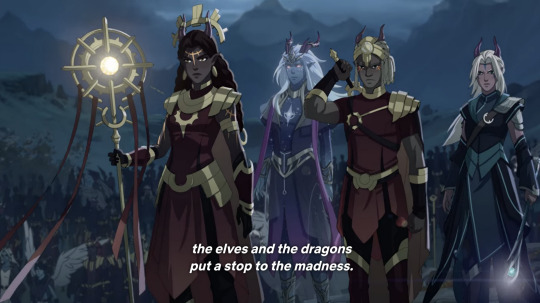
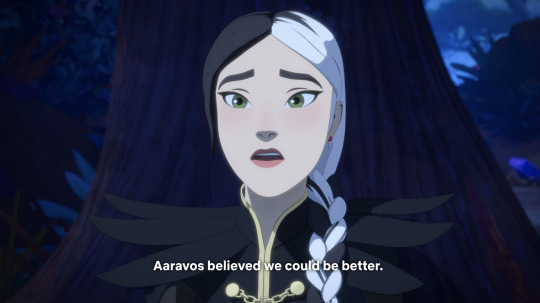
Yes, TDP has different magics with people living under those umbrella terms... for the elves. Humans are coming culturally at things from a completely different angle, and the elves' connection to their primal sources are discussed philosophically in detail, informing their practices and their culture first hand, including the way they chafe against humans, who are arcanum-less. Many animals in the world are also connected to magic, which influences both their design and which ones get hunted for humans' more 'clever' solution in dark magic, including each other.
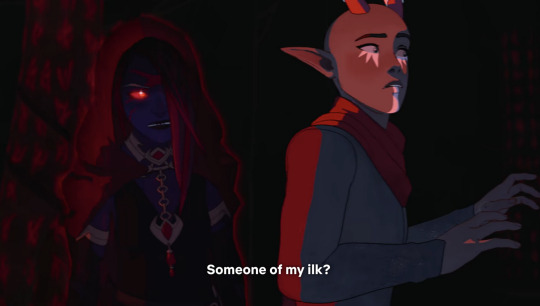
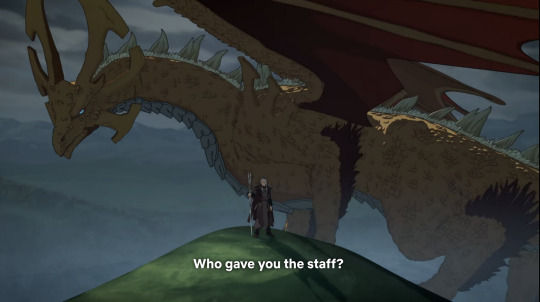
The core issue of the Puppetmaster, down to being a coercive magic formed by someone deeply resentful of their imprisonment? Said puppetmaster is the main endgame antagonist of the entire show with all of S4 onwards being exploring the ethics of controlling people against their will in various methods, and the entire show itself being a thematic battleground of fate (imprisonment) vs free will for virtually every single character.
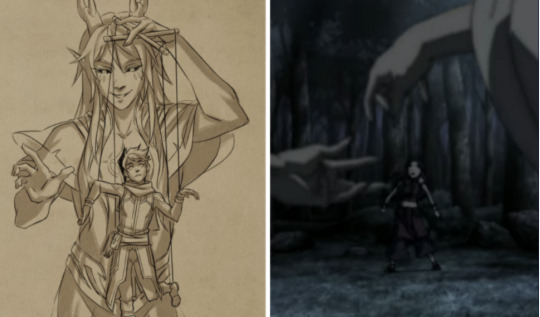
Where ATLA mostly concerns itself timeline wise with ending the war, very little thought is shown by any of the characters as to what they'll do after the war. This isn't a problem (as it reflects the sheer domineering scope of the conflict) but even Zuko being firelord is only ever really addressed with 2.5 episodes left till the finale. TDP, meanwhile, ends its 'war' in s3 and s4 opens up with dealing with the old wounds festering between people with centuries of history, the struggles that come when people aren't able to let go and believe they're safe or mourn in a healthy manner, and the religious/cultural clashes that may occur when trying to integrate different groups of people.
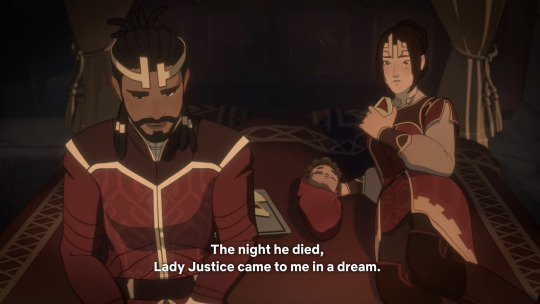
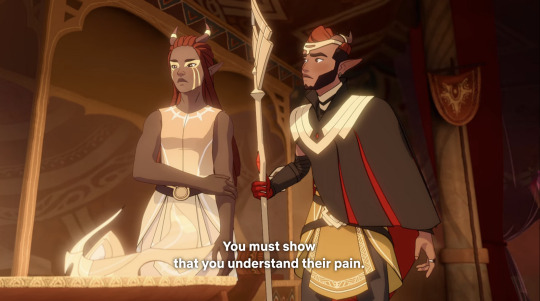
TDP also has an evil father with a devoted daughter and a brother who eventually defects, but it explores the reality of an abusive parent who loves/will sacrifice for you and your right to leave regardless, even if that means leaving the sibling you truly deeply love and who loves you in turn. Which means that when you and your sibling are on opposite sides of a deep ideological conflict, it actually really fucking hurts bc we've seen first hand just how much they love each other and also how and why everything fell apart not in spite of that love necessarily, but also because of it.
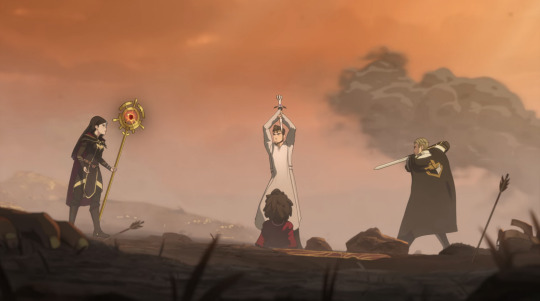
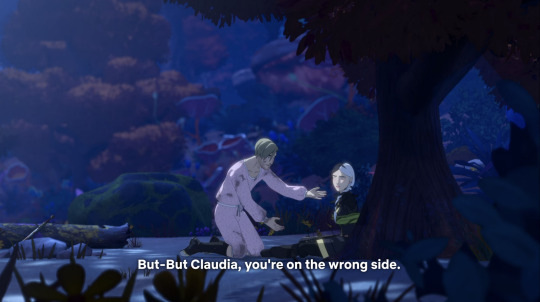
Is this to say that TDP is a 1:1 with ATLA or that it's better? No, not at all, and the latter is subjective. I prefer TDP, but I think they're about on equal ground when you look at each show currently as a whole (although TDP has two seasons left to go).
But TDP takes a lot of what ATLA was doing thematically with some of its most interesting beats and then builds or expands upon them further. It talks further and more consistently about the cycles of violence; in many ways, Jack De Sena's character, Callum, begins the series largely where Sokka had ended (and he's not the most like Sokka anyway; very much his own thing); we get Faustian bargains and centuries' long grief and fucked up people who are trying both succeeding and failing at not doing fucked up things. There are antagonists, but it is very hard to actually label anyone at this point a straight up villain. Moral greyness is where the show starts, and it just continues from there.


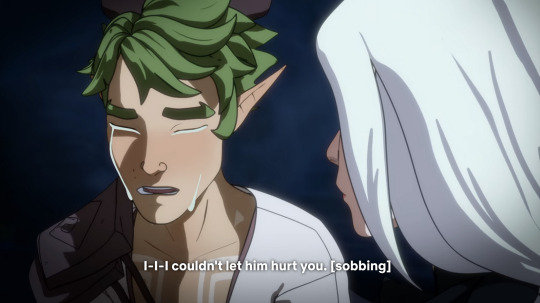
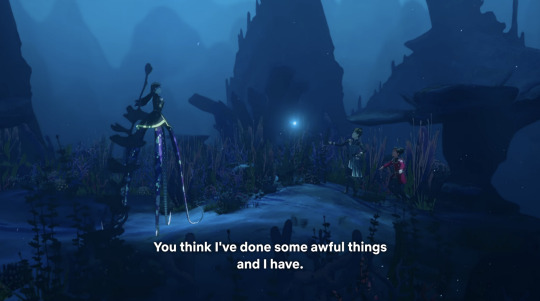
That's not to say the show is nothing but dark and depressing - like ATLA, there's a steady thread of hope and humour even as the show gets steadily closer and closer to its 11th hour point - but the show is usually emotionally heavier. There's more blood and potentially disturbing imagery with body horror and on screen death. There's so much foreshadowing you basically can't go more than 5 minutes into any episode without having something that's going to come back around or be referenced again like 3-5 seasons later.
Just to be clear - TDP is like ATLA, but it's like ATLA in interesting ways beyond the more shallow surface level that usually gets attributed to it, while still very much being its own show and its own thing. And that is why I tend to recommend it to people who like ATLA.
Thank you and goodnight
(Also, the fandom doesn't have any ship wars, and the show is queer as fuck)
#tdp#atla#the dragon prince#avatar: the last airbender#mine#parallels#analysis series#also betrayal. tdp talks a lot more about betrayal#now im trying to think if there's any character in tdp who hasn't felt or been outright betrayed#i. DON'T THINK SO??#atla meta#tdp meta
462 notes
·
View notes
Text
Please indulge me to speak at length about Don Quixote (post Warp Express Intervello)
Unfortunately, this will be riddled with spoilers, however, I'm not necessarily making this post to make any real predictions. I'm mostly just collecting my thoughts, crafting some theories, and talking at length about my thoughts on the upcoming canto, their possible themes, and to gush and wail about my most favoritest sinner ever. If you've finished Murder on the Warp Train then feel free to continue

Alright, end of the most recent Intervello, it was revealed (much to my surprise at least) that Don Quixote, our pride and joy and ever most excellent knight-errant, is in fact a Bloodfiend. A bloodfiend who apparently has their true form suppressed by Rocinante, the shoes Don wears that are named after the steed Don Quixote rides upon in the book.
This new reveal has millions of possibilities forming in my head for the upcoming Canto and here's the gist of what I've kind of formed and gathered from what we know so far in the world of Limbus and Project Moon as a whole, what I personally know about Miguel De Cervantes and his works, and the general thematic ties that are now unfurling within my noggin that I'm trying to spool together in this nice little indulgent post.
Let's start with Miguel De Cervantes:
For those who may not know, Cervantes is the author of Don Quixote, born in 1547, died in 1616. A few important tidbits that I think will be important in the upcoming Canto-
youtube
Something that has been known for awhile is that Don's battle sprite does not list her name as Don Quixote but as Miguel. For awhile now I had been wondering if within Don Quixote's Canto we are going to receive some sort of reveal that Don Quixote is actually Miguel De Cervantes. Originally the basis of this theory I had was a quote from Cervantes about how "[he] would not exist without Don Quixote." (Something that was expanded upon in a lecture about Cervantes and Don Quixote that I found on youtube). In fact a large portion of that lecture, which I will link here, contributed to this idea I had built up in my head about the relationship between Miguel and Don.
What this essentially culminates to in my mind is that the Bloodfiend will reveal that they are Miguel, but for some reason or another, they "became" Don Quixote. So, in many loose adaptions of Don Quixote, this connection is typically made. In my personal favorite adaption, The Man of La Mancha, a musical about the book, they present the story of Don Quixote as a play for prisoners after Miguel Cervantes himself is arrested. And who is the man that plays Don? None other than Cervantes himself!

(you should really give it a watch, it's a lovely musical)
Now, within the book of Don Quixote itself, our titular hero sadly perishes at the end. He loses to the Knight of the Mirror (who is actually the Bachelor Sanson Carrasco, a man hired by Don's family to bring him home) and returns home. He then dies in his bed after renouncing the name of Don Quixote and all of his adventures. Saying with much seriousness that he is not Don Quixote, but Alonso Quijana. He leaves money to Sancho and his estate to his niece and then soon passes (after a heartfelt appeal from Sancho to return to adventuring together once more.)
After his death, the book ends with the author who is detailing Don Quixote's history writing this final paragraph-
"For me alone was Don Quixote born, and I for him; it was his to act, mine to write; we two together make but one, notwithstanding and in spite of that pretended Tordesillesque writer who has ventured or would venture with his great, coarse, ill-trimmed ostrich quill to write the achievements of my valiant knight... And I shall remain satisfied, and proud to have been the first who has ever enjoyed the fruit of his writings as fully as he could desire; for my desire has been no other than to deliver over to the detestation of mankind the false and foolish tales of the books of chivalry, which, thanks to that of my true Don Quixote, are even now tottering, and doubtless doomed to fall for ever. Farewell.”
I've paraphrased it a bit, but you get the gist. While the author detailing Don Quixote's history is a fictional author made up by Cervantes, I believe it is a cheeky way of Cervantes to insert himself in the story and express his true feelings here.
Now, with Cervantes and Donqui being one and the same I believe the strong thematic thread tying this all together is one of dreams. It's now known to us this whole time that Don Quixote is in fact, both dream and dreamer. The monster that Don Quixote is sleeps while they allow for their true self to live, ever dreaming. But now that Dream is Ending.
I think we're going to see the 'death' of Don Quixote and some sort of joining of Miguel and Don. I think Miguel wants to keep dreaming. They are a bloodfiend, a horrible monster, one of the more powerful beings that are mentioned in Project Moon's games. But i think that Miguel doesn't want that. I think that Miguel wants to be cured. Something that has never really been done for a bloodfiend, an impossible dream, perhaps?
I think in Don's Canto we're going to see what we see within the book. Miguel/Don's family trying to get him to come back, to stop him, to get him to give up on this silly dream of Knight-Errantry. And I believe Dante will finally be able to help Miguel take the first steps towards realizing this impossible dream.
Some small little thoughts that I've had that i think push this a bit further.
Don Quixote was written by Miguel when he was 50 while he was in prison.
I've been wondering now whether this cell we see Donqui in within her base ego was actually some sort of representation of this. Don Quixote was born while Miguel was locked away. This looming shadow of Rocinante keeping the Sangre De Sancho locked away within this small starry-eyed girl <3
Nothing that I really have any like, evidence for, but based on vibes I think representing the specific sort of Spaniard from this time period as some sort of high class vampire is excellent and really fits thematically as well.
Cervantes has a bunch of quotes about the nature of oneself and death (bloodfiends are undead). Some that I think are quite fitting are :
“A Man Without Honor is Worse than Dead.”
“Take my advice and live for a long, long time. Because the maddest thing a man can do in this life is to let himself die.”
“I know who I am and who I may be, if I choose.”
“When life itself seems lunatic, who knows where madness lies? Perhaps to be too practical is madness. To surrender dreams — this may be madness. Too much sanity may be madness — and maddest of all: to see life as it is, and not as it should be!”
and finally, to conclude this,
“All I know is that while I’m asleep, I’m never afraid, and I have no hopes, no struggles, no glories — and bless the man who invented sleep, a cloak over all human thought, food that drives away hunger, water that banishes thirst, fire that heats up cold, chill that moderates passion, and, finally, universal currency with which all things can be bought, weight and balance that brings the shepherd and the king, the fool and the wise, to the same level. There’s only one bad thing about sleep, as far as I’ve ever heard, and that is that it resembles death, since there’s very little difference between a sleeping man and a corpse.”
If you read this whole thing, thank you for indulging me. I greatly appreciate it.
139 notes
·
View notes
Text
Why “Hiding in the Light” Didn’t Work: Stranger Things’ Psychospiritual Implications
Supplementary Sources: Jungian Theory & A Wrinkle In Time
Alright, buckle in. I’m running on a year’s worth of spiritual awakening, deep dives into Jungian theory and non-dualism, and my own ego’s primary coping mechanism: immersing myself in media as escapism. The purpose of this analysis is to break down the themes of non-dualism and light/darkness in ST (and maybe predict some character arcs), and also to position the narrative of ST as a psychospiritual wake-up call.
For some context: last year, I discovered the work of psychoanalyst (or philosopher, depending on who you’re talking to) Carl Jung. He had a pretty extensive theory about the human psyche that I immediately connected to the themes throughout Stranger Things, specifically Vecna’s mind control and curse. I’m going to break Jung’s theory down as succinctly as I can, and then delve into how it plays out in our favorite gay monster show.
But before I delve into Jung’s ideas, I also think it’s important to define selfhood (you’ll understand why in a minute). For the purposes of this analysis, the experience of the “self” is an illusion created by our senses, perceptions, memories, and consciousness, all of which are impermanent. Therefore, the self is what we call “conditioned.” There is no you or me, just the ideas we have of ourselves.
Now, we can get into Jung’s theory. He posited the following:
1. Every individual has a “persona” they show the world (a constructed self) to feel like they belong. Underneath this persona, everyone has a personal “shadow,” or the part of themselves they don’t want to acknowledge. This shadow is always projected onto others— every negative thought we have about someone else is a product of our own unintegrated shadow. Note: The shadow is NOT bad, it just “is.” It’s actually there to HELP us grow and integrate all the unhealed parts of us.
2. Individuals’ shadows are usually part of their unconscious, meaning most people are not aware of their shadow side or cannot bear to delve into their trauma/darkness and begin to heal it.
3. All of human consciousness is CONNECTED. This means two things. 1: There is a “collective unconsciousness” that contains the sum of all of our unintegrated trauma, and 2: We can heal our collective unconsciousness by healing our own unconsciousness.
How do we heal our own unconsciousness? By becoming AWARE of our shadow side, accepting and forgiving the conditioning that created it, and working to encourage others to do the same.
What— or rather, who— does that remind you of?
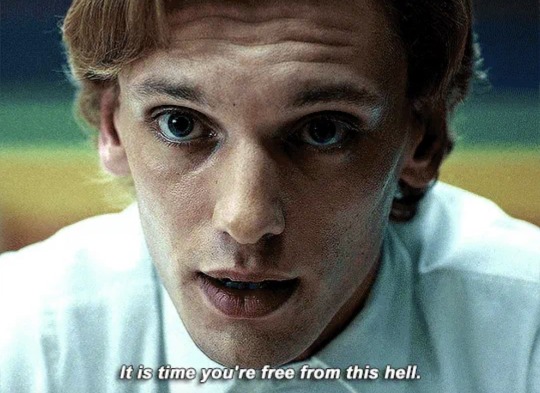
Also— great use of lighting here.
We know Vecna has direct access to his victims’ consciousness; not just their memories, cognition, and emotions, but also their awareness itself. This is how he’s able to target and trance people. But it’s not just their consciousness Vecna has access to; it’s their unconsciousness. Their shadow. Their trauma. Yes, he has psionic abilities akin to El’s, but as far as we know, El can’t access the collective unconsciousness like Vecna can. She is only capable of “remote viewing” via the void or piggybacking into people’s minds. So why is Vecna capable of this?
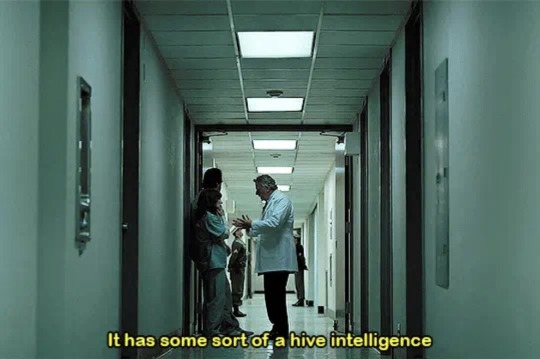
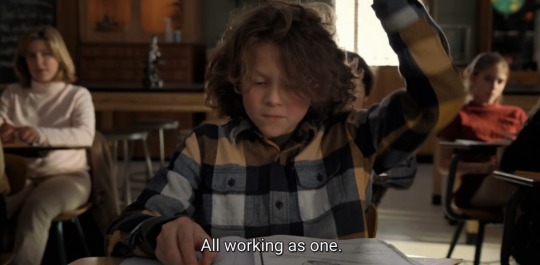
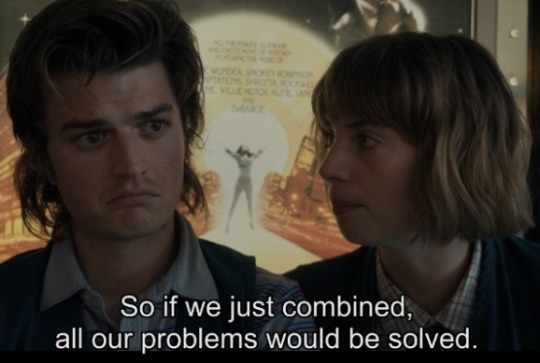
If you want my take on it: the only way to access a collective shadow would be through accessing your own shadow. So is Vecna really Henry, or his unintegrated shadow? And is either really condemnable, considering the larger themes of the show?
We see this theme of non-dualism echoed in Brenner’s NINA pep talk with El:
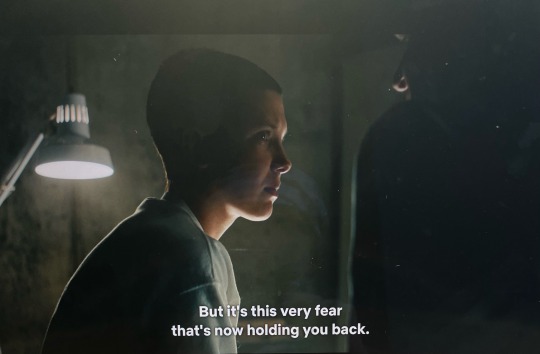
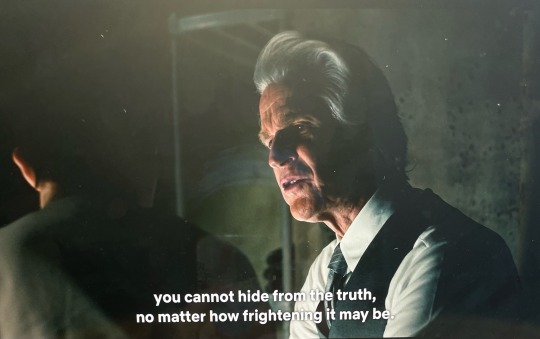
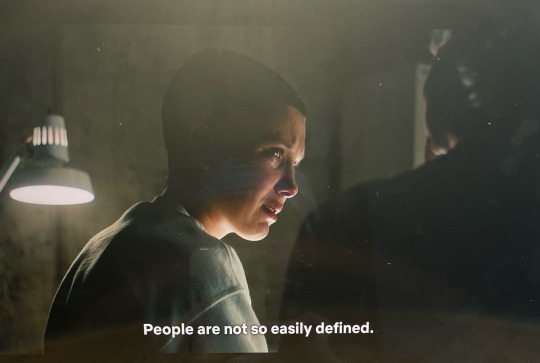
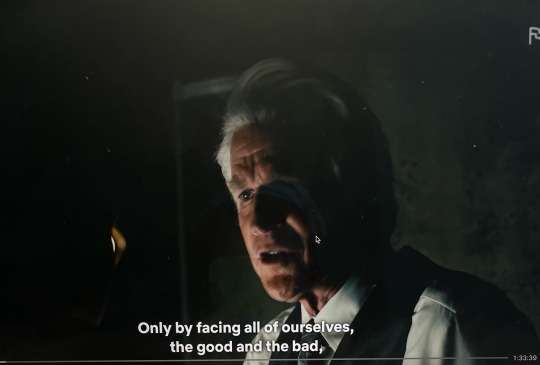
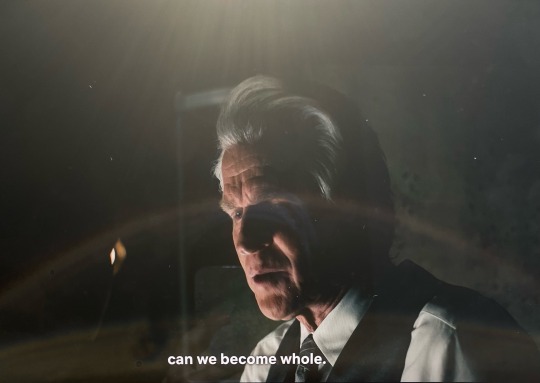
It’s fascinating to me that they’re communicating these bigger thematic ideas through the show’s “villians”— while the above conversation could be taken at surface-level as Brenner being manipulative, it’s important to acknowledge the truth of what he’s saying. NINA is only successful because El faces “the good and the bad.” This is why “hiding in the light” is a no-go for Max.
Focusing only on happy memories is a form of emotional bypassing. Throughout the show, we’ve been told time and again that hiding doesn’t work. Neither does running away. The only way out for our characters is through their own shadows.
Now, the fun part: predictions. Looking at all of this with a Jungian lens, it doesn’t make much sense to villianize a character or to end the story by “defeating evil.” In non-dual theory, there are no evil people, only unhealed ones.
We know what worked for our characters temporarily (Will in the UD, Max in her first trance, El using her powers against Vecna) was the memory and vibration of love.
This reminded me of A Wrinkle In Time, which is a science fiction novel that’s been noted more than a few times as one of Stranger Things’ primary influences. In the book, a girl and her brother travel through time to rescue their father from an alternate dimension where all beings are controlled in a hyper-individualist suburbia by a giant, all-knowing brain. The climactic “defeat” of the brain is shockingly simple, but incredible impactful— Meg, the heroine, tells it over and over that she loves it. This love ultimately brings her father and brother out of trances they are in, and they’re able to remember her and travel back home.
(Tangent: And God. The implications of that, outside of analyzing ST, are powerful. How do we live in a capitalist hellscape that is so caught up in the mind— in acheiving, obtaining, securing, protecting the ego— that many of us have forgotten our hearts? The answer is love. Loving ourselves more deeply to love all beings more deeply, “the good and the bad.” But love does not negate accountability, and it does not excuse harm.)
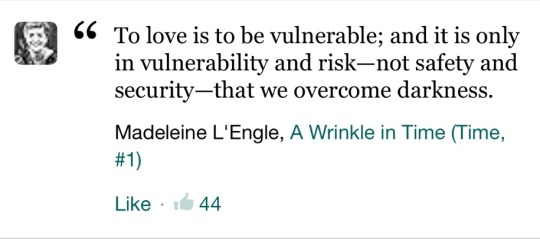
Our characters are all struggling with self-acceptance and self-love in some form or another. Each is wrestling with secrets and lies, and the desire to hide parts of themselves they think others can’t accept.
Mike is clearly struggling with self-loathing, guilt surrounding what happened to El in s1, and a crippling hero complex.
Will is also on the self-loathing train, continually self-sacrifices to his own detriment, and is hiding his identity out of fear (not at all villifying that, just for the record.)
El struggled to reconcile her abilities and forced weaponization with her identity outside of the lab pre-s4.
Max was suicidal and had a lot of self-hatred after B*lly’s death.
Nancy parallels Mike in her survivor’s guilt post-s1 and exhibits the same lack of self-preservation and self-sacrificing tendencies.
You get my point. So how will these characters overcome their trauma? Not through hiding, or running, or bypassing. Not through the light alone. Through love— acknowledgement of their own darkness, compassion for the unhealed nature of others, and commitment to being honest with themselves and their loved ones. We know Will is El and Henry’s mirror/foil and will play a central role in S5, and with all of this in mind I think it’s safe to say he will break the cycle of bypassing and hiding from trauma and pain once and for all. He won’t fight it like El, hide from it like Max, or run from it like he did as a kid.
Only by integrating their shadows can our characters become truly “themselves,” or as Brenner puts it, “whole.”
I will probably have much more to say about this after my re-read of A Wrinkle in Time, but for now, that’s all I’ve got. :) Hope everyone is doing well!
#i dont normally do posts like this but my brain has been whirring lately#stranger things#byler#mike wheeler#will byers#vecna#henry creel#st5 speculation#st analysis#stranger things analysis
190 notes
·
View notes
Note
Jon being emphasized to have the skillset to raise children well is a very important signal that he is fit to have a hand in the next generation of House Stark, that his presence and influence will be not just possible but vital. It's not his "blood and seed" that is required, it is his whole person
Beautiful. If only he could pair up with a lady who’s also fond of children. I heard she’s at the Vale taking care of a sick and spoilt child with infinite wisdom and patience.
(post referenced)
Goodness me! What a lovely thought! It's almost as if the image of Jon building and improving on Ned's good parenting example could be matched by a maternal mirror image, not just thematic but - get this - even visual, leading to a full-circle reassurance that the parental legacy of these people will live on and thrive.
Awww, I wonder if vague hints of fertility, motherhood, and a rebuilding connection to Winterfell and House Stark exist for this girl you mentioned... Oh, she is literally wanting to name her future kids after her siblings and rebuilding Winterfell from Snow, you say? From her first appearance everything revolves around her future marriage and children? "Flowered" surrounded by chapters describing the Winter Rose as the mother of a Stark heir through the female line? Described as "key to the North" and "blood of Winterfell" in a way only Jon Snow matches?
Well, well well... I hope no one forms any plausible hypotheses based on this purely circumstantial evidence presented in a book series where similar cases of circumstantial evidence are already revealed to foreshadow concrete plot developments.
104 notes
·
View notes
Text
TDP S6 poster!!!
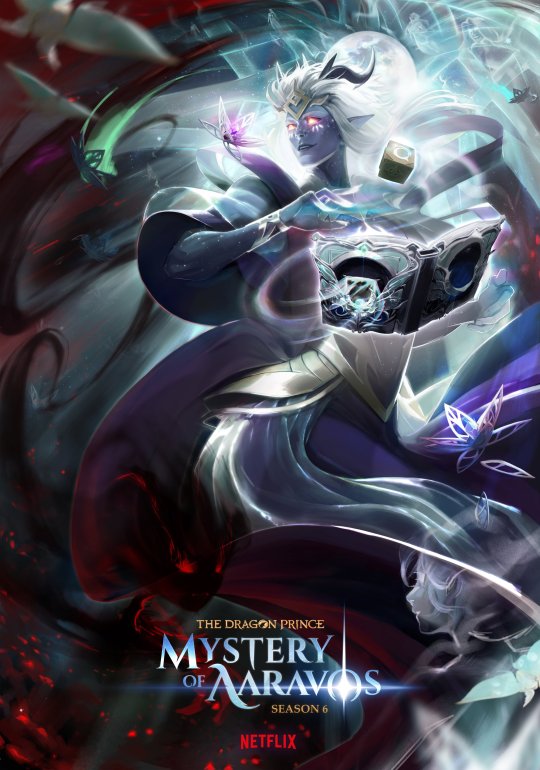
let's see what we've got in this one! omgomgomg
this won't make a lot of sense, I'm just gushing
First impressions: there is a LOT of magic going on in this poster, and most of it seems to be Moon magic, which Aaravos is casting from his cool book.
There are moon moths everywhere!
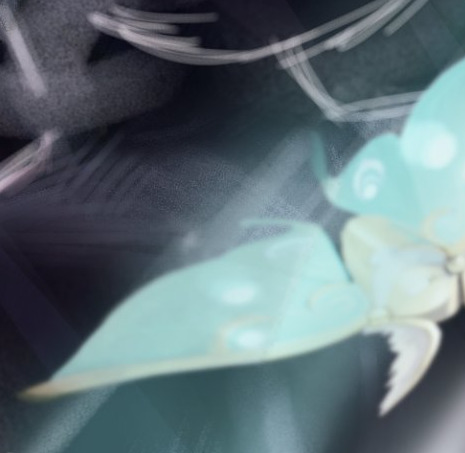

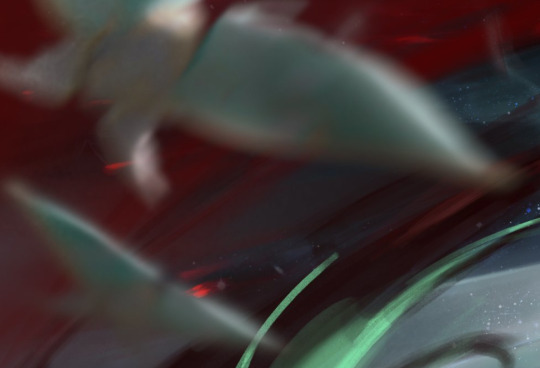
Ethari's lotuses are everywhere too!
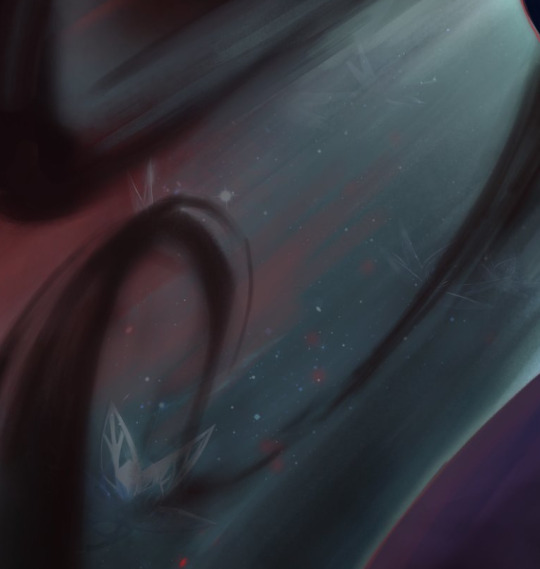
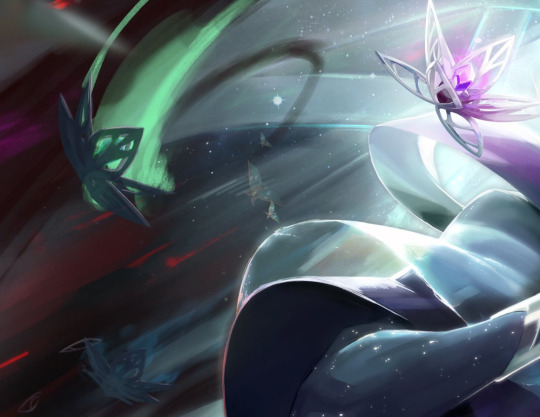
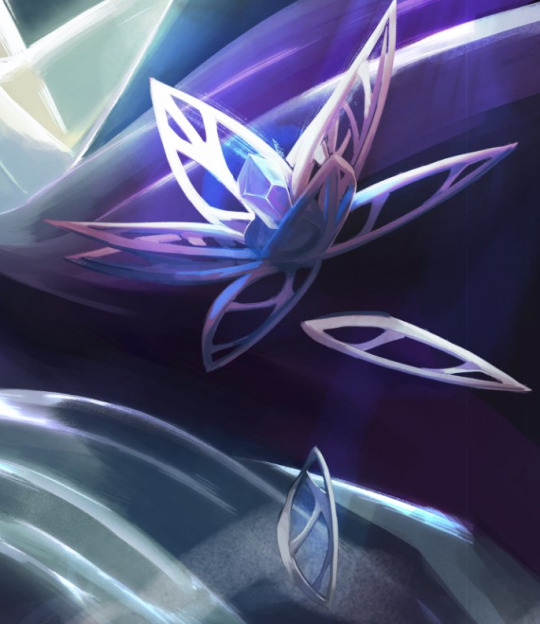
Some of them are breaking. Some of them have vivid colors coming from them. They could be from the differently colored crystals they all have.
There are also a large number of spirits in the picture!
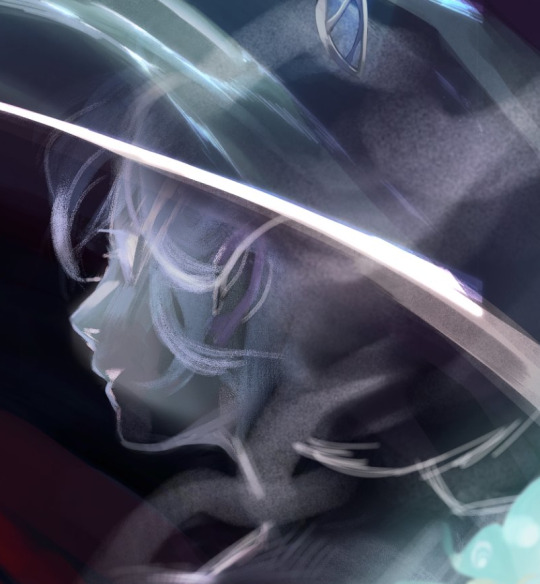
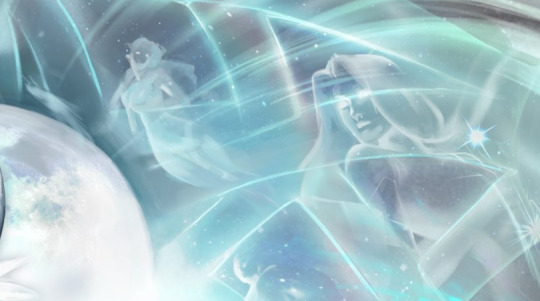

There's also a red colored spirit, uh oh:
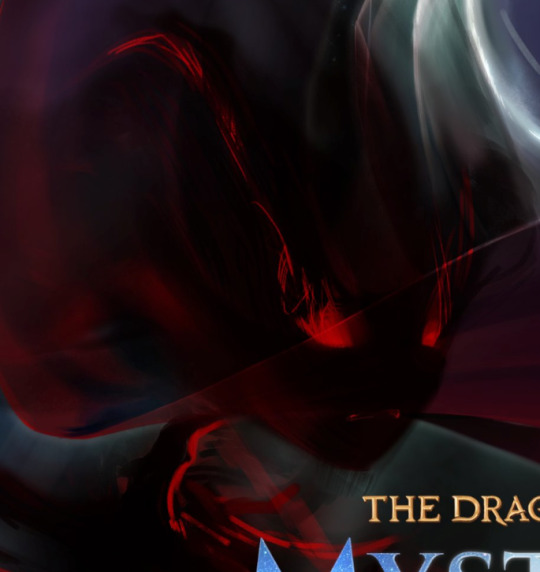
Is this one looking at the white one, do they see each other?
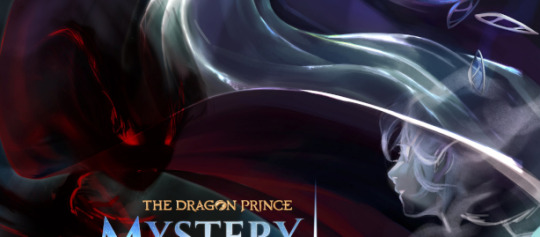
Aaravos has a full moon behind him, and his cube has a blazing moon rune on it. I'm not sure how many other moon themes this poster can hold, are we missing any?
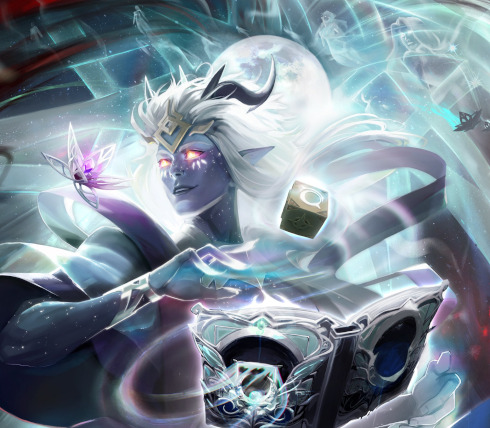
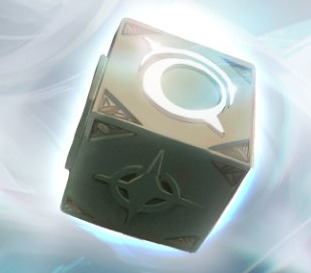
Of interest, there's a thematic similarity to the key art we got of Rayla jumping into the Moon Nexus, where the lower left was dark and creepy with lost spirit arms and the upper right was lighter with the arms of her family reaching for her. In this art, those corners are again the darkest and lightest:
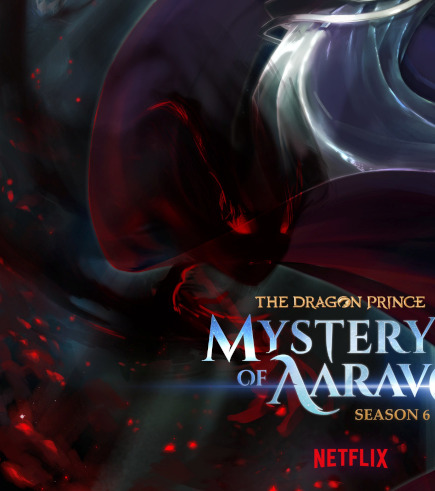

And then there's the man himself. His eyes are glowing bright with magic, he's got his bling on. And it's hard to be certain since we can't see his chest well but it's likely that his star is lit, as it gets when he casts magic.
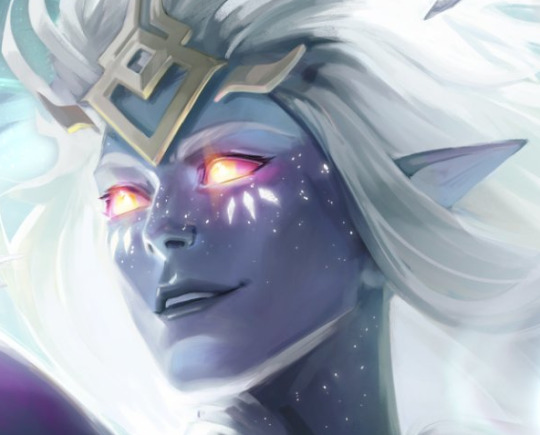
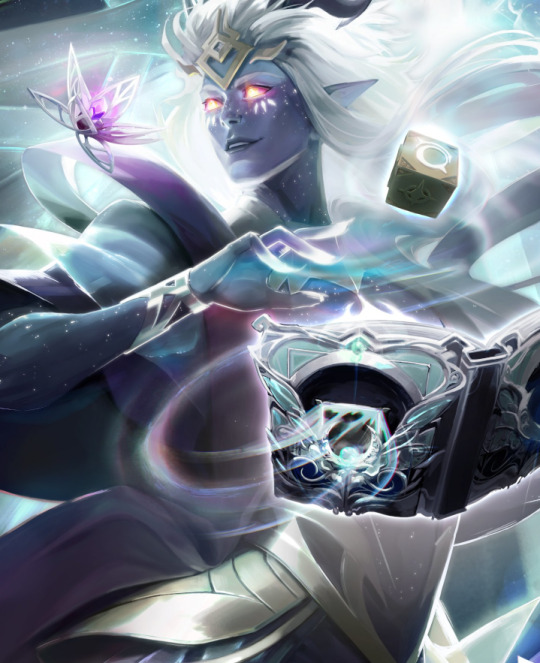
Okay let's take a quick peek at what is actually happening in this poster. Aaravos is casting magic from the book. It's pouring out of the cool crescent-moon portal thingy there and swirling around.
eta: it's actually connecting the rune cube to the book, but I'm not sure which way the connection is flowing. But he seems to have plugged the cube in, and it is called the Key of Aaravos. Is this book the thing of great power that gets unlocked in Xadia?

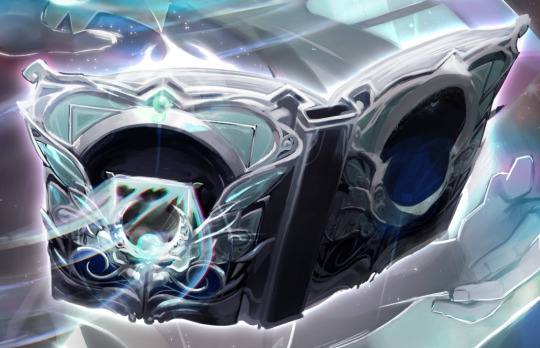
And behind him, across the top of the art, you can see something else: a weaving of thick white strands.
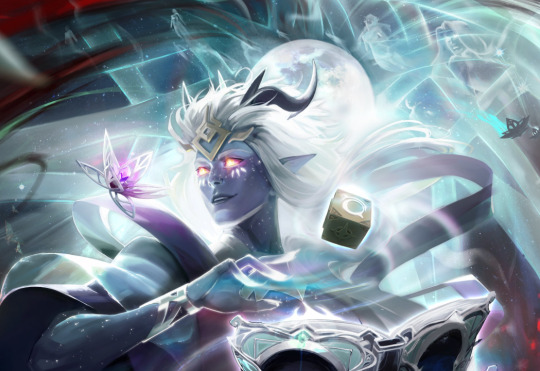
What is he actually doing? Is he weaving them, or unweaving them? Is he just releasing three elves from their coins? This looks way more powerful - and destructive - than that. Is he releasing all the spirits ever? Why are there so many spirits in this picture?? Where are they from? Are they also trapped? Were they crossed over? Is he breaking the whole duality of life and death?
Aaravos wouldn't bother casting a measly little spell just to free three elves from coins just because Callum asks him to, not when he could flex stylishly and get something he also wants out of the deal.
Remember when he helped Viren get past Lux Aurea? He didn't have to kill Khessa and poison the Sunforge to help Viren reach Zym. But his method got the caterpillar a burst of primal magic so it could start growing, it stopped the Sunfire forces from retaliating, it gave him some form of payback on Aditi's bloodline, and it stopped the Sunfire elves from being able to use the Sunforge on anyone else corrupted with dark magic. Plus it netted him Pharos and made Viren trust him even more. It was indeed elegant and efficient.
So he's probably doing something on that level again here. Sure, Callum may have given him an opening to help Rayla's family out. But Aaravos will stop when Aaravos decides to stop, and not before. If Callum makes a deal to free three souls that he can't get out of their coins on his own, then Aaravos can definitely work with that.
But he thinks bigger. If Callum wants three souls freed, that's easy enough. But why stop at three? It's so inefficient. Maybe he attacks the Moon Nexus next, and makes it volcano out all the souls it's ever held and looses them on the world in some kind of spirit plague. Job still done, deal met, requirements satisfied. And while the mortals scramble to deal with his mess, he just does whatever he has planned next. All the better that he did something so big that no one can step away from cleaning it up to try to stop him!
Anyway. Art gives me thoughts. Very excited about this poster and its moontastic implications for S6!
#tdp#tdp spoilers#tdp s6 spoilers#tdp poster#tdp s6 poster#aaravos#moon themes are gonna be very big this season
92 notes
·
View notes
Text
“disco elysium fans ignore the themes for gay ships” I am adding the crunchiest themes with my gay ship thoughts I could write a dissertation on mazovian yaoi already. I could say so much about what the game does when it thematically ties “communism” and “love”. from the mazovian socio-economics thought: “[communism] hasn't really worked out yet, but neither has *love*—should we just stop building love, too?”
I could say a lot about the extremely conflicted relationship that communism seems to have with raw human emotion, on the one hand it’s the foundation of everything. revolution is built on rousing up emotion, and the end goal is some kind of euphoria-utopia, phrases like “hope in work and joy in leisure” in the game remind you of that. the total fulfillment that is longed for and promised. the end of alienation is about emotion
but then there is a sort of terror that human emotion will cause reaction and undermine the cause and needs to be controlled, guided by a firm hand, manipulated, that it can’t just be let loose on the world. that it’s careless emotion that draws people away from the cause and towards the allure of other ideologies. intellectual rigor is needed to resist it all. critique, critique, critique
and love is one of the most terrifying and uncontrollable emotions, especially romantic love for another person. it’s such a deep form of interpersonal connection and yet it’s often destructive of a person’s true self in the name of an idealized image born of that intense emotion (and oh boy does disco elysium have things to say about that). it defies critique, it sings its own song, it blooms from within and overtakes all reason
lashing the themes of love and communism together, from the lurid tales of eight hour sex to the explicit and possible relationships between historical figures... war crimes committed not for the sake of power but in an achillean (in both ways) rampage, institutions and systems like décomptage being founded from a romantic partnership, characters whose passion for the cause is mingling with potential attraction and devotion to each other, the hanged man was killed by communism but love did him in—
it’s about emotion. in disco elysium, emotion is a kind of materialism
784 notes
·
View notes
Text
We Need To Talk About Nightbringer (the Person, Not the Game)
I'm still scratching my head over what Nightbringer's goal is here... How is MC involved? Why send them back in time? And, of course, who are they??
SPOILERS Up to Lesson 12 Below Cut
The Fuck is the Goal Here??
Sending the MC back just to form pacts makes no goddamn sense. If the MC acquiring pacts was the real aim, then that mission was already accomplished in the present-day. There's something more here.
Why send MC back to RIGHT NOW? What about making pacts AT THIS TIME is desirable to Nightbringer? Is the end game even having the pacts at all...?
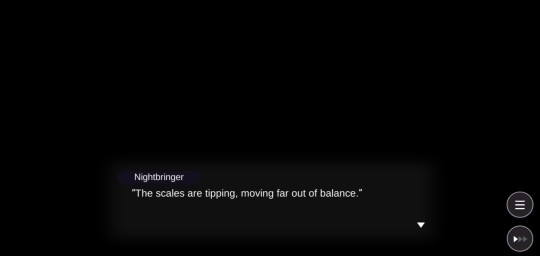
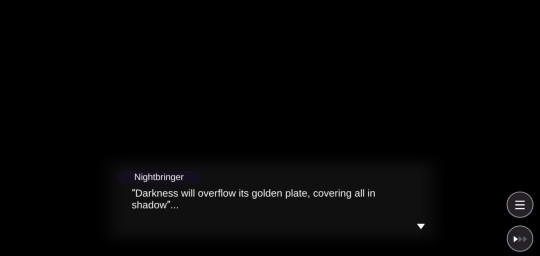
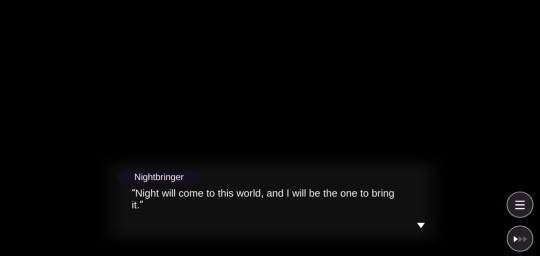
I posit that Nightbringer wants war, specifically, another war between angels and demons. The imagery of scales brings to mind the fragile balance of peace that Diavolo was mentioning between the realms before. RAD isn't built yet, his goal to improve relations is still in its infancy, and the times are so tumultuous that MC risks an all out fight starting just being there. So if Nightbringer wants to make things come to blows, then this is the PERFECT time to send them to.
However...
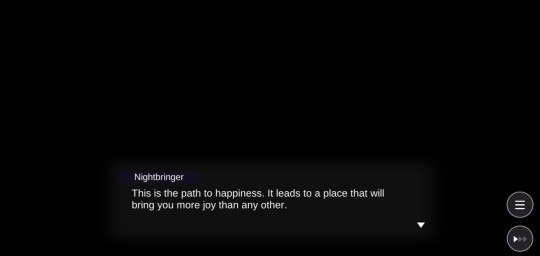
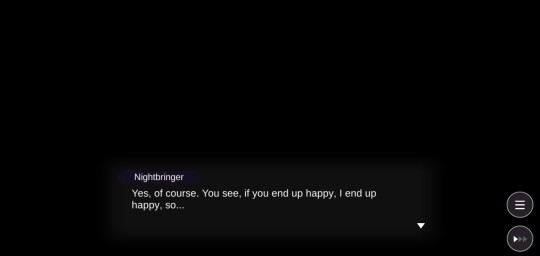
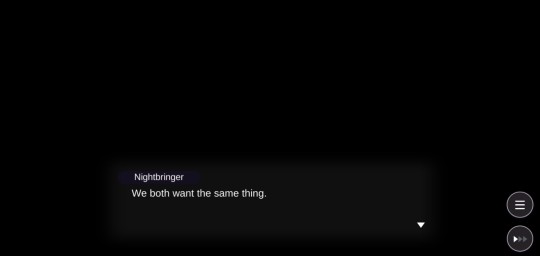
What is this "path to happiness" all about? What does Nightbringer think will make the MC most happy...? And what about THEIR happiness is linked to his? Is he assuming that in a war of the three realms, MC would side with the demons and thus if demons win then MC will be glad? That doesn't really track with the MC as presented in game... They're generally shown as a peacemaker or bridge builder. I don't think a war would make them happy at all!
Ultimately, I don't think we can answer this question in any way that makes sense until we have a better idea of WHO Nightbringer is so....
Who is Nightbringer??
It's Barbs
This goes for any version of Barbs: past, present, future, or even an alternate self I guess. This only makes sense because we're dealing with a demon who does time travel and there's only one demon we know who fits this bill but... why?
I can't imagine any reason why Barbatos would betray Diavolo, at least the one we know. This guy is so loyal to his lord that he's the ONLY character who won't completely kowtow to MC's whims even in the OG game. His true loyalty was always to Diavolo. Not the realm, not demons, DIAVOLO. And if Diavolo seeks peace, then why on earth would Barbs want to cause a war?? Is he more bitter about things than we thought...?
If it's a different version of Barbs, then I guess this goes out the window, but even then what's an alternate Barbs care about this world specifically? What would he hope to gain? MC? Why?? The means are all here, but I just can't figure out the motive, so...
It's Not Barbs, but Connected to Barbs
You know. I've been thinking a lot about this and I've been considering how, thematically, it could be appropriate for Diavolo not to be the only one with a progenitor/parental figure out of commission. We can assume that Daddy Devil must of had an attendant like Barbatos to aid him like Dia has Barbs so...
What if Nightbringer is the old King's previous attendant? And what's more, what if they aren't Barbs but related to Barbs? Like a sibling or parent? It's important to note that Barbs' time capabilities are not INTERNAL to him. It's his room of doorways to other timelines. Presumably, anybody with sufficient knowledge could inherit that room and just take over the role of the Devildom's time lord.
I know it goes against all of our previous notions to think that Barbatos was, at some point, just an everyday demon and not some primordial, OG force of nature but none of that was canon anyway. Something to think about.
It's Michael
I know people keep offering up this one, but I'm really not buying it... Yeah, Michael has always been this looming, shady figure over the OM universe and he's canonically and non-canonically done some eyebrow raising shit, but what's the motive here? Plus, Nightbringer's thematic ties to, well, night really feel more demon than angel... The Celestial Realm is always sunny, the Devildom is always dark. I think it's just a stretch...
Michael wanting another war could be interesting, especially since we've seen far more of angels being actively antagonistic to demons than the other way around, but I don't think that makes him Nightbringer. At most, he could end up being a shadow ally in his plot to bring everything to a head once again.
It's Solomon
In truth, even I don't think Nightbringer is the Solomon we're talking to. But I still think it's suspicious that all of this plays out so perfectly for our present-day Solo-pal... Personally, I take anything this guy tells us directly with a grain of salt since we know he'll lie openly, so here are the facts we're working with:
We are interacting with our present day Solomon (or at least one with knowledge of who we are and our timeline's events).
Solomon is the only one in this current space who knows of our full history in the OG timeline.
This Solomon put himself not only in the position of being the ONLY ONE who knows us that we can interact with, but happily isolated us from the brothers and made himself our main point of contact.
And last (and perhaps most importantly) HE'S STILL TRYING TO MAKE PACTS. He approaches Lucifer about it and successfully makes a pact with Asmo centuries before he's supposed to! If my guy is really from the present, that's like, Changing the Course of History 101! What the hell???
Let me present to you a theory. He is not present-day Solomon, sent back to help MC. He is past-Solomon, caught up to MC's identity through Barbs' time powers and just playing the part of our modern-day buddy. If he's from the past, he doesn't have to worry about changing the present timeline like we do because that ain't even him we've been speaking to. It feels like he has this bet going with Nightbringer... they have some kind of wager and MC is key to it. They're the one who'll tip the scales and Solomon is trying to get us to stay on his side.
It's Not Solomon, but Connected to Solomon
There's something off about Solomon that everybody, LITERALLY everybody, makes comments on: how he doesn't seem human anymore.
The OM timeline introduced the idea that a person can become something else, no matter what they started out as. The brothers were angels, but they fell, so they became demons. Simeon violated angel rules, so he was made into a human. The idea of corruption related to Solomon has always stuck in the back of my mind... The guy has over 70 pacts, he's lived for several centuries at least, and there's just something NOT RIGHT about him...
When Solomon and Nightbringer are speaking to each other, this line stuck out to me.
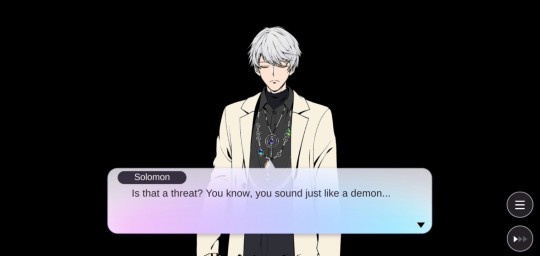
I find this comment so damn weird. If Nightbringer is a demon and has always been a demon, why would Solomon feel the need to lampshade this? He's pointing it out as if it's meant to get under Nightbringer's skin... Why state the obvious?
What if Nightbringer wasn’t always a demon?
Nightbringer refers to and brings up his demonness as much as Solomon brings up his humanness. That, to me, reeks of insecurity. They may not just be fighting on the lines between demons and humanity, but fighting each other/themselves to prove who's side they're actually on.
What if Nightbringer is a fully-corrupted Solomon? Either a Solomon in the future who's fucking around with the past or a Solomon in this timeline/dimension that's trying to use MC to cause destruction for his world??
..... Okay, I do know this is a bit of a reach. As much as I would love to blame the sorcerer, Nightbringer still seems like a being who's just... been around a while. Far too long to start fucking up shit now. It's possible that if he is from the future and just hopping through time, there's nothing stopping him from going back however far he wants to, but then you could get into the "You are your own grandfather" paradox and the next thing you know we're in another installment of Kingdom Hearts where time is our worst enemy.
HOWEVER, the idea of corruption DOES bring me to my wildest theory yet.
What if Nightbringer wants MC to become a demon...?
Think about it.
It could explain why Solomon is trying so hard to make MC remember and side with their humanity.
It could explain why Nightbringer sent them there under the guise of demon to start with.
It could be why he wants them to make their pacts again. He's trying to seduce them into fully embracing the demonic world through their connection with the brothers.
Humans die, right? Why not be a demon and not have to worry about it?
Throw away the Ring of Light.
Stay by your demons' sides.
Embrace the darkness.
Join the damned.
And when that big'ol battle that he wants happens, he'll have the most powerful sorcerer/sorceress, fully demonized, fighting for his side against God himself.
..... Or that's my spec script anyway. Probably too out there, but man would it be fun...
#my money is on option two#but option five would be WILD#or you know#my trust issues are acting up again#obey me#obey me shall we date#shall-we-date-obey-me#obey me nightbringer spoilers#obey me nightbringer#obey me nightbringer theories#omn spoilers#omnb spoilers#obey me solomon#omn solomon#obey me barbatos#omn barbatos#obey me michael
538 notes
·
View notes
Text
The obsession with wanting "consequences" to TOTK's ending are infuriating and shallow. (Massive TOTK Spoilers ahead)
"Why did they have to change Zelda back?"
Because her kingdom NEEDS her. Everyone, not just Link, is fighting together to get her back. NPCs tell you about things she did in between BOTW and TOTK to help them, stressing her importance as a leader. One of the schoolchildren waits outside her house every day in anticipation of her return. Speaking of which, Zelda was able to take her nerdy interests and love of learning and channel that love into bringing improvements to Hyrule via establishing a school and a research team. The kingdom is worse off without her. The title "Tears of the Kingdom" is important because the tears are Zelda's, and she IS the kingdom since she's all that's left of the royal family. It's kind of like the story of the Fisher King: the King is the land, and if the King is sick/ailing, so too is the land.
The main theme of the game is community. Director Hidemaro Fujibayashi had this to say about the game's core theme:
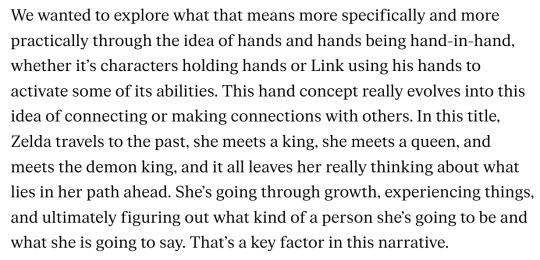
Everyone working together to push back the forces of evil and save their homeland. It's emphasized that Link (and many of the characters, especially the sages) can't do the job alone; he needs help. This even extends to the ending. Link's Recall wouldn't have been sufficient to change Zelda back; Rauru and Sonia amplify his power the same way Sonia and Zelda amplified Rauru's light beam in the Gerudo Invasion memory. Likewise, Rauru and Sonia couldn't bring Zelda back because Link had the necessary ingredient: a motive in the form of his love for Zelda. Just like how Zelda found the necessary motive to unlock her powers and save Link in BOTW, so too does Link accomplish the same in TOTK.
Leaving Zelda as a dragon would have contradicted her character development in BOTW, which amounted to her learning to move past her failure and loss from the Calamity. She also, um, can't figure out "what kind of person she's going to be and what she is going to say" if she's a dragon. The end of her arc amounts to her taking up the role of leadership and restoring her kingdom with the help of Link, the sages, et al. Again, the theme of community, connections, and working together to overcome obstacles.
"Why couldn't she come back with dragon features?"
To quote Mr. Garrison: "That's fucking stupid."
Sonia explains that Recall recalls an object's memory, meaning the only result of the Literal Triforce of Link, Sonia, and Rauru using an amplified Recall on Zeldragon was to return her to the state she was before she ate the stone. This is why her stone is tied around her neck at the end. She couldn't have leftover dragon parts because she was never a dragon to begin with. Also, the greatest loss one could suffer from becoming a dragon is, as emphasized by Mineru, the loss of self, not the body.
"Why does Link get his old arm back?"
The amplified Recall restored it. Also, thematically, it works better for Link to grab hold of Zelda's hand with the hand with which he initially failed to grab her at the start of the game.
"Changing Zelda back nullifies her sacrifice."
No, it doesn't. She fully accepted she would never change back. She wasn't thinking about the possibility of Link saving her because as far as she knew that was impossible; she made her decision out of love for her kingdom and Link. In the end, she succeeded in her mission (as did Link). If she made the sacrifice with the assumption Link would save her, then I could see this argument holding water. But Link was never going to give up on her because he LOVES her. Even she's in disbelief at having changed back (and very thankful because now she's home). In the secret ending, she says, "I never thought I would stand in this place again." We feel the weight of her sacrifice in the final memory, and the ending provides an emotional release because we the player repay her for all she did to help us and because she more than proved her heroism. I liken it to the ending of Pinocchio (1940) wherein the Blue Fairy changes Pinocchio into a real boy as a reward for giving his life to save Geppetto's.
"Her not remembering being a dragon is a copout."
Mineru explains very clearly that becoming a dragon means losing one's self. You lose all your memories and indentity; you cease to be the person you were. So, yes, she wouldn't remember being a dragon flying around for centuries. But you know what she would remember because it happened before she lost all sense of self?
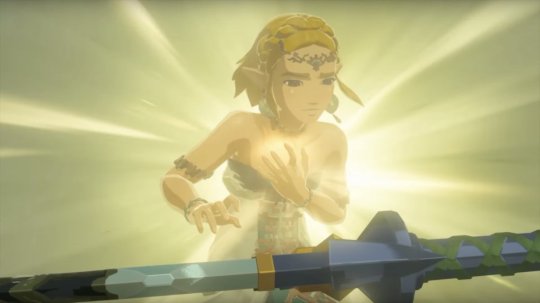
Though not outright stated, it's clear from the character animation that Zelda was in immense pain as the transformation began to take effect. Also, you can tell she was absolutely terrified in that moment. She knew what she was doing was necessary to save her kingdom, but she's thinking, "Shit, these are my last few seconds before I lose myself forever. I'll never see my loved ones again: Link, Purah, Robbie, Riju, Sidon, the schoolchildren in Hateno, etc. And I'm doing this all on a MASSIVE gamble and act of faith that Link will find me, reclaim the Master Sword, and destroy the Demon King." That's not the kind of traumatic event you'd easily forget. She'll probably be contemplating "Wow, if Link hadn't been so determined, I wouldn't be here now and that would have been my last moment alive," for some time. And no, you don't need to see her suffering psychological effects in-game; that's best left up to the viewer's imagination; there's only so much story they can cram into the game before it's overstuffed.
"Why did Rauru and Sonia come back to restore Zelda?"
Because they loved her, and Zelda loved them. From the moment Zelda met them, they promised to find a way to return her home to reunite with Link. They have an emotional (and familial) connection to her. By helping Link restore her, they're extending a final act of love to the princess they adore so much. It's a beautiful sendoff to them, because unlike Zelda's biological parents (Zelda's mother died when she was six, and Rhoam was too busy being a king to actually be a father to her), they were able to provide for and help her on her journey. It would have been a mistake to not bring them back to wrap up that plot point.
I think a lot of nerds suffer from Cinema Sins/TV Tropes brain: only able to deal in the most literal without any room for meaning. "Punishing" Zelda for her sacrifice wouldn't have added anything to her arc, as the whole point of her character isn't to be a stoic symbol for her people to mindlessly obey. The game deals in second chances, not just for Zelda obviously but also for Link. Link gets a second chance at the end to catch Zelda to make up for not catching her at the beginning; that's parallel storytelling with actual deliberate meaning behind it. Otherwise, the story amounts to, "He fucked up and there's nothing he can do about it." Remember that much like Zelda, Link had enormous pressure placed on him from a young age. He was expected to carry his duties out lest the entire kingdom be DOOMED FOREVER. But with TOTK's ending, he can realize that he doesn't have to worry about that pressure since no one's forcing it on him anymore. He can shape his own destiny and bounce back from a mistake; he doesn't have to lose Zelda forever.
I've already explained that the power Link, Sonia, and Rauru use is just an amplified Recall, but technical explanations aside, it's mainly the sort of scene that's driven more by emotions than by "logic." A good example of a scene that relies on the emotions of the story to carry it is the climax of Disney's Dumbo (1941). Animation critic/historian Michael Barrier writes:
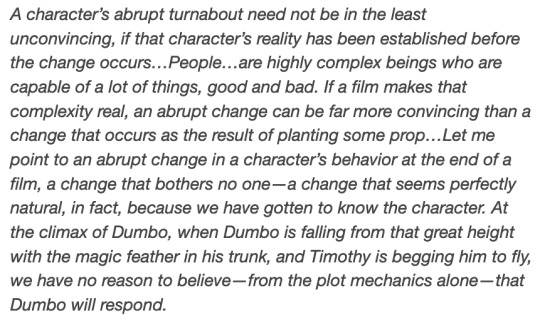
If you're the sort of person who questions why Dumbo is able to fly without the "magic feather" or how Dorothy Gale goes home just by clicking her heels and repeating the mantra "There's no place like home," you probably shouldn't be watching movies.
Special thanks to @avalypuff, @blueskittlesart, @thecagedsong, @aquaticpal, and @nolongerapileofashprobably for their posts on the subject; all of you made some excellent insights on the ending and how it ties in with the game's themes. I'll go ahead and link to said posts for further reference:
#princess zelda#totk spoilers#zelda totk#tears of the kingdom#the legend of zelda#nerds please stop learning media literacy from cinema sins and tv tropes#this post took a lot out of me#but i had to get it off my chest#a darker sadder ending would not have worked thematically
275 notes
·
View notes
Note
are the arknights girls gijinkas of their names or are they just named like that
Uhh kind of neither. Arknights girls choose an operator code name for themselves when they join Rhodes Island. Some choose their actual names and are just named that, which means you can have an operator named Dorothy Franks choose Dorothy, but you can also have an operator named Olivia Silence choose Silence. Why is her last name Silence? Not important. Other people choose things that are thematically appropriate for who they are, construction worker Shana Moleman also works in combat as a defender who carries a big shield and acts as a wall to protect people behind her, so she choose the name Cement. There are all sorts of reasons to choose the names they do, Pudding choose Pudding because her new boss that was flirting with her called her Pudding and she just thought it was a nickname. The in universe animal/monster-girl race that is on Manticore’s medical record is just “Manticore”. Every character is different
This is to say that the people who design Arknights operators have their own reasons for choosing their names. For Asbestos’s case she is a salamander girl, her role in a team is tanking magical damage that is often in the form of fire. Salamanders used to be thought to be made from fire, as when they set logs that they were sleeping in on fire they would scurry out of the flames, this connection between salamanders and fire went on for a long time and also inspired things like charmander from Pokemon. Because salamanders were thought to be connected to fire or even fireproof, when the soft, fibrous, and extremely fireproof material asbestos was discovered it became known as “salamander wool”. Asbestos the material is toxic and carcinogenic, Asbestos the character exists in a world where there is a somewhat common terminal illness called oripathy that is essentially a magic rock cancer, people tend to be very afraid of the infected as its grants them increased ability to do powerful magic and when the disease kills them their body spreads infectious particles everywhere around them. Asbestos the character is one of the infected, and she’s also a toxic asshole who has only one friend because she’s very abrasive and rude to basically everyone and likes to be alone. All of the things about asbestos the material fit perfectly in the package of Asbestos the character. She’s a fire-proof, flamethrower-wielding, magic resistant magic tank, who has cancer, has the potential to spread cancer, has a toxic personality, and is a salamander girl. While in canon it seems there’s just an extremely fitting hazardous material that she named herself off of, in reality her name was likely decided early in her design to make all the elements of her fit together perfectly
Sorry that’s probably a longer answer than you wanted lol
106 notes
·
View notes
Note
hey! i really enjoy your analysis of aang and zuko's relationship, and i was just wondering if you have any thoughts on this:
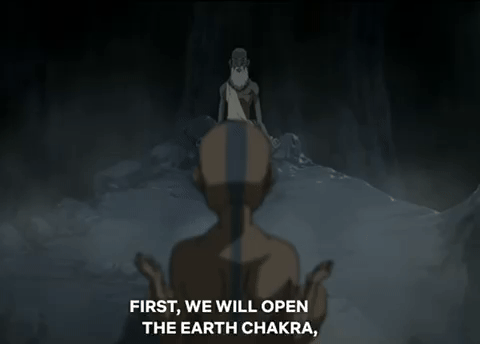
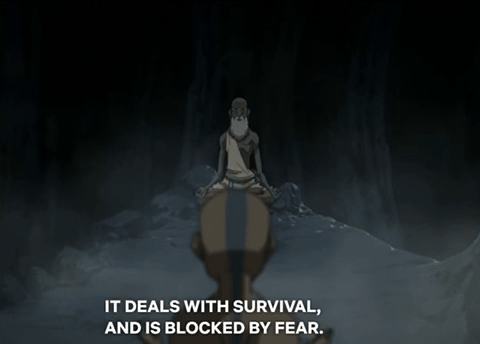
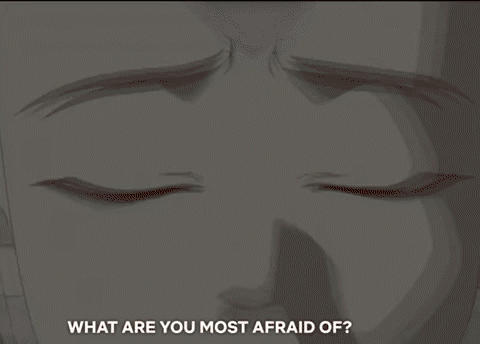
when aang considers what he's afraid of the most, he doesn't just see zuko - he sees the blue spirit. why do you think his fear is linked to that mask? zuko was the most amicable towards him when he put that mask on, and was hostile every other time.
Ooooh!! This is such a rich and meaty question!! And it's something I've wondered about but never dove into before.
I guess there are a couple of questions we need to explore. One, do we want to begin to analyze this from Aang's perspective or the series' themes, which, when put together, should offer us the fullest idea of what the intent might be? If we begin with Aang's perspective, then the next question we need to next ask what is Aang's view of Zuko and/or the Blue Spirit at this point in the narrative? My worry about beginning at that intimate level is that we might miss possible connections that a thematic understanding might facilitate and may, like many fandom analyses, leave it at a character level when, in fact, the characters exist to serve larger philosophical purposes, especially in a show like ATLA.
So, we'll return to those questions about Aang after we visit some questions about the broader themes here. We know for a fact that the team did a lot of research into Eastern philosophies that they had to then pack down into 24 minute episodes, preserving a surprising amount of complexity not in the words but in the actions and visuals. The 2 part Crossroads of Destiny episode is probably the most evocative of this practice. The four-way fight scene is celebrated for the way it masterfully shows character development through fight choreography. Then, Aang's crystal chamber he forms to master the Avatar State is a direct reference to a statement about pre-enlightenment in one of the foundational texts about Japanese Zen for American Buddhists, "The Three Pillars of Zen." The rapid explanations of the seven chakras with Guru Pathik might seem like a a skimming of Tantric beliefs based on the brief statements and processing, but it's another prime example the way ATLA suffuses meaning beyond the script.
What more can be said about the Earth (also called the Root or Muladhara) Chakra, then, that the show might reflect without stating it explicitly. Guru Pathik explains that the Earth Chakra "deals with survival." Is there any subject more prescient than that for our protagonist, the single survivor of an otherwise all-encompassing genocide? Other accounts of this chakra that I can find explain that it's at this chakra that one can observe that their base needs are being met--enough food, enough water, etc. There seems to be a subtle witnessing to the effects of PTSD here then. With this chakra untouched, unopened, and out of balance, Aang within his mind has been living in a state of emergency without knowing it, believing himself at a core level beyond his consciousness to still be under immediate threat even in moments of peace like his meditations throughout the opening of his chakras. "Your vision is not real," Guru Pathik points out, not to say that no danger exists for him in the world but to illuminate the immediate reality surrounding his person.
The memories and visions that flash during the sequence hint at how fear conceals deeper realities and thus possibilities. I'll start with the clip of Katara sinking away from the first episode of Book 2, "The Avatar State." The Earth Kingdom General performed this cruelty after many other attempts to force Aang into suffering to gain the Avatar State. Believing he lost another person he loved, the state was triggered despite the actuality that Katara was unharmed. The fear of her loss overwhelmed Aang, and even her safe return could not assuage his traumatic response. The Blue Spirit incident forms a striking parallel to this event, in that case. Aang felt himself helpless and in danger only to discover the opposite: the seemingly malevolent force freed him from danger. Further, that Blue Spirit Mask concealed Zuko who, by the end of the series, will be revealed (to himself and) Aang as an ally and a friend. The shadowy image of Ozai, then, connected with these two fear-inducing semblances, can be seen then as perhaps the ultimate foreshadowing of Aang's ultimate success in pacifying Ozai. Put in the context of this chakra and the other two visions, it frames the Firelord as a facade meant to induce terror and distance, when in reality, life and humanity still lay behind the horrifying megalomania.
Concerning the Blue Spirit element specifically in the series, I want to explore one more factor within the series before getting back to Aang's character relationship in this moment. Blue has a running symbolic theme within the series that seems especially relevant here since it played a huge role in a highly symbolic part of the directly previous episode, "The Earth King." As Zuko rides out his psychogenic fever induced by releasing Aang's bison and abandoning his Blue Spirit mask, he is confronted in his dreams by a blue dragon voiced by Azula and a red dragon voiced by Iroh. I felt really confused by these two would-be shoulder angels for the longest time (literally until I was sorting my thoughts out to write this) because Azula's blue dragon is the one who entreats Zuko to rest, which even in Grey Delisle/Azula's clearly threatening tone--she even ends the temptation by saying "sleep just like mother!"--seemed to be what Zuko needed to do as opposed to the red dragon's exhortations to get out. I could see how sleeping might also refer to accepting his upbringing without thought, but why blue? The layers upon layers of possible meaning overwhelmed me.
I posit that blue in the series, especially when put in relationship to red/orange, as it is in the dream sequence, the dynamic between the water tribe and the fire nation, the fire of zuko and azula (especially the final agni kai), and the energy-bending of Aang over Ozai in the finale, ought to be read as Yin (making red/orange yang). Yin is passive, retractive, and receptive, which makes the invitation to rest by a blue dragon make perfect sense. Yin is also feminine in nature, hence the association with both Azula (whose blue fire and lightning becomes especially interesting to explore under this understanding) and Zuko's mother in the dualistic dragon dream. If you know anything about yin and yang, you know that it's key tenet is ever-changing coordination of yin and yang within one entity and with relationships between entities rather than the privileging of one above another. The two dragons in Zuko's dream, while seemingly in opposition to one another, are actually seeking, like the bumper stickers say, "coexistence" of their dispositions.
Now, back to Aang's vision of fear over the Blue Spirit. The red that overlays everything is specifically a reference to the Earth Chakra, which is symbolized by the color red. But the fact that he has one fear of Katara, the pinnacle of blueness/yin in the series, dying, and another fear of the Blue Spirit, a de-flamed (read: emasculated) Zuko attacking him that are then overlayed by this Earth Chakra red, a color otherwise used to portray yang (masculinity, activeness, expansion, and repulsion) and the fire nation in the series, suggests that his fears are specifically about within holding onto yin nature (symbolized by his grasping for a disappearing Katara) without being entirely overwhelmed by it (in the image of the fear he felt as the Blue Spirit approached his imprisoned body). And all those fears are intensified when living in such a patriarchal, or yang-skewed age and society, which gets depicted through both the final image of Ozai, the ultimate patriarch within this world, and the red coloring.
I promised I would get back to the characters, and after that hopefully illuminating thematic expansion, we can hopefully get at the core of what's going on here for Aang personally and what it might mean for him to be picturing Zuko with the Blue Spirit mask as a fear. I want to put this moment into context with Aang and Zuko's relationship at this specific moment. Aang hasn't seen Zuko since he watched him cry over his uncle in the ghost town after Azula struck him with lightning as a diversion. That was ten episodes prior (and more than 6 months time if you were watching the show in real time as it premiered; May 26th-Dec. 1st). The next time Aang sees Zuko, two episodes later, they are glowering across a crystal prison cell at one another with antipathy as they're embraced (a gesture I can only remember from the fantastic black romance film Love & Basketball, and in a gay context that is clearly referencing that moment in L&B, in the Norwegian teen romance series Skam). Right before this scene, Aang readily agrees to co-rescue Zuko and Katara with Uncle Iroh despite Sokka's protestations. Nothing seems amiss with Aang, no obvious belligerence toward Zuko until he sees him. Zuko has barely seen the airbender this whole season, and the one moment they encountered one another, Zuko was attacking Aang's attacker rather than him. Why is Aang expressing anger toward Zuko in the crystal chamber then? It's a rare expression from Aang even when we look at their more antagonistic interactions from the first season.
Here's where this vision of the blue spirit Aang envisions as he opens his earth chakra might enliven his characterization and his relationship to Zuko. We get two pieces here. His attachment to Katara and the queer implications of his partnership with the Blue Spirit/Zuko. And they are inseparable.
I don't feel that I need to especially dive into the attachment to Katara since it's been a pretty big component of discourse within the fandom, both in general analysis and more specifically relating to the (literally historic) shipping wars between zutara and kataang that emerged after the series came out originally. What I'll say here is that the first vision that Aang has as he addresses his root chakra points to his fear of losing her and what she represents pretty explicitly and, as I suggested earlier, also provides its antidote in the realization that accepting/surrendering the fear of impermanence reveals its simultaneous illusion. Katara wasn't actually harmed and wasn't truly lost when the general subsumed her into the ground. Aang has to let go of her as a permanent fixture that he'll always be able to see and know entirely (not, as many have interpreted it, let go of loving her). He'll also have to let go of saving her and the world of so many others she represents, which is as much a pressure and role Katara and others put on him as Aang yolks himself to.
Part of this acknowledgement of Katara's impermanence as a living being and a romantic possibility is addressing the others in her life who pose both danger and attraction for her. Zuko embodies both of these things simultaneously. The aggressive stare Aang launches at Zuko in "The Crossroads of Destiny" can be understood through this lens. The Eve Sedgwick's concept of the triangulation of male homosocial desire between romantic rivals was one of the foundational ideas of queer theory. It's so well-established as to be a meme among the tumblr crowd. The show even references the history of these literary homosocial tropes in "The Avatar and the Firelord" as Sozin and Roku's tight-knit youthful friendship is slowly rent apart at the event of Roku's heterosexual marriage, which thus begins the imperialism of the Fire nation.
Except that Roku and Sozin aren't romantic rivals. And Zuko's obsession with Aang begins sans Katara. And, as you pointed out, if the romantic threat is Zuko, it ought to be Zuko in the Earth Chakra vision instead of the Blue Spirit? Well, those all exist because ATLA is not a tragedy for homosocial relationships, and it's hard for me to explain how groundbreaking that was.
You see, the show theorizes homosociality differently. If Aang is required to let go of Katara, he has no pivot point, no object (because women shouldn't be objects for male fodder!) to connect with and compete with a rival male, so he has to look directly at the desire of another male for him and, therefore, face the fears that he might have similar desires. I said above that the Blue Spirit is an entirely de-flamed Zuko, which I then paralleled to emasculation. One could even go farther to call it a kind of symbolic castration (Firelord Ozai losing his firebending at the end of the series certainly demands this kind of reading). These aspects ignite fears about lacking masculinity which then cause reactions, which make men avoid accepting any thoughts and behaviors associated with vulnerability and homosexuality invoked within themselves or by others.
I think Aang, in his way, is confronting these fears but not from the angle of someone raised within a homophobic or misogynistic culture. His openness to Zuko and the potential of connection to him is ripe from the first time they meet--"you're just a teenager" connects them without any intermediary. He comes to understand the rigidness of the environment he's in, though. He feels like he's being forced to choose between a yang/masculine role he plays with Katara, who at this point in the series though growing out of it and certainly not a fault of her own making still sees him as her savior and depends on him to save her and the world through metaphysical mastery and the repulsion of evil, and yin/feminine role he plays with Zuko, who finds Aang in and forces him into positions of elusion, surrender, and passivity, while requiring his compassion and forgiveness. When the Blue Spirit comes swinging his swords (read that with all the innuendos you want lol) at a shackled Aang, it's the ultimate expression of Aang's potential for submissiveness because, not only is he entirely helpless but the one who could harm or save him in that scenario is another who is not participating in the expected power of fire/yang/masculinity.
I think everything in the show says this is attractive to Aang--that he remains with Zuko immediately after their escape from the fort, that he reflects on the Blue Spirit as he opens his chakras, that a reference to the conversation that followed their escape that Zuko makes halts him in his tracks when Zuko asks to join the team. Zuko's Blue Spirit persona means a lot to Aang, a scary amount, and my point is that it's this fear of the meaningfulness of their encounter as two men who are not the masculine paragons they are supposed to be which Aang faces as he opens his chakra. As much as he wants Katara, he wants Zuko. He fears he'll lose Katara and he fears he'll lose his life to Zuko. These are the dichotomies he's tackling as he processes the Earth chakra.
Aang eventually opens the chakra, but that's only to say he acknowledges and surrenders his fears to a destiny and understanding beyond his control, not that he necessarily learns how to address and solve all the conundrums contained therein. We know he chooses his attachment to Katara at the end of the episode to obtain power over the Avatar state but perhaps we could've been clued into this choice by noticing he has not chosen Zuko with that initial glare Aang gives him. Aang hasn't found a way in his chakras or his heart to hold both Katara and Zuko at once, so he chooses Katara and expresses a newfound jealousy and rivalry toward Zuko (not that Zuko's at his best behavior at this point, but it's Aang who initiates the exchange).
By the end of this season, Zuko abandons the Blue Spirit mask and Aang loses his life for prioritizing Katara and a yang-centric mastery of the Avatar state. The next season involves all three of the protagonists finding more internal balance between yin and yang for themselves and accepting mutually reciprocal feelings for one another that allow them to escape the kinds of patriarchal tropes that have dominated Anglo- literature for centuries. The ability of this brief sequence to highlight so many of the series' central revolutionary themes speaks to the depth of the show and the way it invites the audience to think about rich subtext rather than pedantically hammer us with morals will just continue to be the gift that keeps giving from this show.
Thanks so much for asking! Didn't know how much I missed doing a deep dive into this kind of stuff.
93 notes
·
View notes
Text
Hey, I'm rambling about IkePri again
Okay, I just need to get these thoughts I have about Gilbert von Obsidian out because I enjoy predicting stuff and overthinking design and narrative choices even tho they might not be right. :P But there really isn't that much predicting other than me overthinking about narrative and design choices. This time there will be most likely spoilers of Gilbert's route so far, and route of Clavis and some thoughts I have just gathered while playing the game in general. I try to put these thoughts in cohesive order, but well... I don't know if I can really, because I just need to get these out of my head.
These are my thoughts, ramblings and opinions. Feel free to form your own and certainly disagree with me! I apologize about the lack of art in this post. I'm busy with work currently so no fanart for a while. I'm also not native English speaker, so there might be grammatical errors and such. Sorry about that.
Everything under the cut.
To start with Ikemen Prince is a romance visual novel first and foremost. That doesn't mean it can't be deep (and it certainly has been deeper than I initially expect, which left me positively surprised). I suppose there is somesort of thematic vibe that there is no prince whose ideals are the main thesis of the game itself. But that also kinda leaves that fact there is no huge catharsis regarding the world and it's state. Everything so far has been left quite open. And the more I have learned about lore of the world, I really feel like anti-monarchist here xd Clavis really sold me the idea for real. Or atleast throw away the absolute monarchy. That's where I think things should go, but that's my own belief. (really, the last king of Rhodolite... He umm... I have some opinions.)
Chevalier and Gilbert
First things first: I don't hate or dislike Chevalier as a character. There are just some things that give me Deus Ex Machina feels. But I know it is what they are going for with him. This genius that so far ahead of everyone that it is so alien concept to rest of the people. And well that is a very hard concept to pull off without being a genius yourself as a writer. Or that is what I feel like.
But what I do love is what the writers are doing with him and Gilbert in thematic sense! (Hence why Chev x Gilbert sounds so juicy to me)
I really took steps to the deep end as I started to think about why I have enjoyed Gilbert's route or was interested in his story to begin with, but have little interest in trying Chev's one. Because they are so similar but they really aren't.
How I would describe it is that where as Clavis is the complementary to Chev, the purple to his yellow, the emotionality vs rationality, the heart vs the brain, Gilbert is more like right brain to Chev's left brain. If it makes sense like that xd
Their color schemes are harmonious. Not opposite. Almost like how Nokto and Licht's color schemes are harmonious with each others.
(Nokto (Blue + white + gold) vs Licht (Blue + black + gold)) Not to mention that their names clearly are meant to mean light and dark. (Licht: variant for light, Nokto: comes form latin nox or noctis, meaning night = dark) But that is a rambling for another time.)
Both their crests are tigers. White and black tiger. Chev's color scheme is White + gold and black. Whereas Gilbert's is Black + gold and white. But then the overall color that game devs use to signal about the characters baffles me a bit. Gold/Yellow vs Black/dark red. They don't seem to have too much connection or that of which comes to my mind quickly and without digging deeper. (because I believe that if you dig deep enough, you have digged yourself into a trap of overthinking about things. (Justifying things because you want to justify them, which I'm not big fan of. And sometimes things don't need meaning and we have to live with that. As much as it pains my overthinker brain.))
But here is my impressions about Gilbert so far. I'm at the point where MC has left the Clavis's party (I loved it btw). Gilbert really does give me toxic INFJ villain feels, but let's not get too hang up on terms such as that. But he is someone who is driven forth by his own ideals and desire to change the world better. He, like Clavis, seems to cloak himself in this idea that he is the villain and is okay, even happy, to take that role. He is the one who, like Chevalier, has thrown away emotional attachment out of the window (or so they say) unlike Clavis who makes his choices based more on emotion rather than rational thinking.
Maybe that's why I like Clavis and Gilbert, they push MC out of their black and white thinking. That things are not so easy peezy as "choose a right king and everyone will be happy". There will always be someone who is mad about it. That's why I really loved the scene with Gilbert with the orphaned kids and the Clavis's party. He seems to enjoy the company of children (who are not morally corrupted or tainted) and he really empathically listens to those who are angry. He believes in the idea that "no one remembers what you said, but they will always remember how you made them feel". (A quote with debatable origin, people say that it was coined by Maya Angelou. But I really love this quote, because I think it is the truth.) Gilbert isn't trying to rationalize against someone's choices with pure intellect. He uses empathy to guide him to the most rational outcome in that emotional scope. But he also uses this to manipulate people with fear. He uses fear extensively and he does it actively. Where as I feel like Chev just has that aura about him automatically.
Hence my next thought: Action vs Stasis!
Gilbert and Clavis are action oriented. They shake the gameboard, they make the first moves. Gilbert probably more than Clavis. They both want change. Is it change for the better, we will see, I still haven't finished Gilbert's route but he really gives me this "I'm willing to become the greatest threat so that people unite to defeat me." or "I will conquer all so there will no longer be wars.". Chev, on the other hand, symbolizes stasis. His goal is to keep the kingdom of Rhodolite going. That's his duty and he is willing to take it. (even tho we can debate if that is something he really really believes in or even thinks about that much. I feel like it is out of obligation rather than of personal ideal. But alas, I have not played Chev's route yet.) Chev is reactive rather than proactive. He waits for the opponent to make the first move and reacts accordingly. (I'm not saying he is not reactive once game is on. More like "if there was not threat to deal with, he wouldn't create one".)
Chev doesn't care what you think about him. Gilbert does. He might seem like he doesn't but he is really there to prove a point. (I will pick up his dislike for lying later >.>) Chev is not. Chev knows that his way is the right way for him and that is enough for him. Chev also actively makes a "gettaway plan" for himself in Clavis. He knows that Clavis is the final thread that keeps him from going overboard because he understand that he has to be blind for "individual people" aspect to be a good ruler. Gilbert probably understands this about himself too, but he is trying to prove a point. So he needs to go overboard. Because masses of people need absolutes to react to. If it is something banal, it won't do. His evil actions need to shake the very foundation of ideas. The people have to face those things head on and see it for themselves. They cannot be sheltered. Gilbert gives me the vibes that he is willing to sacrifice himself not for the kingdom, but for the betterment of all mankind. He is happy to become the villain #1 if that means that other people will rise and take down the corrupted Obsidian or the corrupted idea. I would say that he is Lawful Good going on about things like Lawful Evil.
Gilbert asking questions means that he wants you to think, he wants to challenge your opinions and how you look at the world. Same as Clavis. They yearn for change. They want to change the world. Where as Chev wants to maintain things as they are. Chev "If it is not broken, we don't need to fix it" Michel. Where as Clavis and Gilbert want to improve the system. They are idealistic.
Gilbert and lying
This is something very interesting. At first I thought that he was all "I dislike when people lie to me." but he really is "I dislike lying in all its forms." And he does say that he doesn't lie. And I'm starting to believe that is really the case. All the things he says are true. But because how other people see him, they are suspicious anyway. Like MC is. Like we all probably are when we start the route and think "So what is your trauma, baby girl?"
When he is unsure or knows that he shouldn't say the thing he really thinks or that is true, he will deflect or give a very vague response. Which makes me quite happy to replay his route at somepoint with this in mind.
In conclusion:
Welcome to my TED talk, with no head or tail, just me overthinking about things about a otome gacha game. If you read this far, thank you for your time. Remember, if I ramble about it, it just means that I'm invested. Have a good day~
#me rambling about ikepri#dicenete rambles#ikepri#thoughts#gilbert von obsidian#clavis lelouch#chevalier michel#is this what they call a character study#or analysis#TED talk#ikemen prince
54 notes
·
View notes
Note
have you been asked to review the Tapu pokemon yet?
As a whole, I really like the Tapus. It's neat to have one guardian per Alolan island, and the designs themselves are well thought out. I really like how each one has a set of white triangular markings with a darker border, which allows each one of them to be very distinctive with unique designs and palettes while also making sure all three look like they belong together in a group. This is also enhanced by them carrying tiki-inspired masks, with each one being based on a different animal that also influences the creature itself to some degree. Good stuff.
Thematically, the Tapus are also based off of the four main Hawaiian gods (Koko, Lele, Bulu, and Fini seem to be based off of Kūkaʻilimoku, Kāne, Lono, and Kanaloa respectively). I'm obviously not Hawaiian so I don't feel qualified to judge these guys on accuracy, though it seems like Tapu Koko is the most on-point with the feathered look while Tapu Fini is the least, having little to do with the deity it's based off of aside from a vague connection to the ocean.
Regardless, all of these designs are distinct and do a good job standing out from other legendaries, as well as tying back into their region. There was clearly a lot of thought that went into them in terms of both functionality and visual aesthetics.
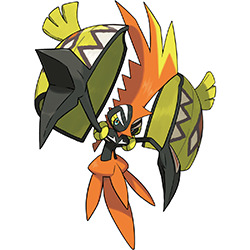
Tapu Koko is my personal favorite of the bunch. Vaguely based off a rooster (side note: I'm amazed we don't have a rooster 'mon yet. I guess Blaziken counts but it's only a rooster in the vaguest sense of the word), it sports feathers, a beak-like structure on its face, and a mask that it forms a beak with using its pincer-like hands. Really neat! I also like the mohawk becomes the rooster's comb when the mask is closed.
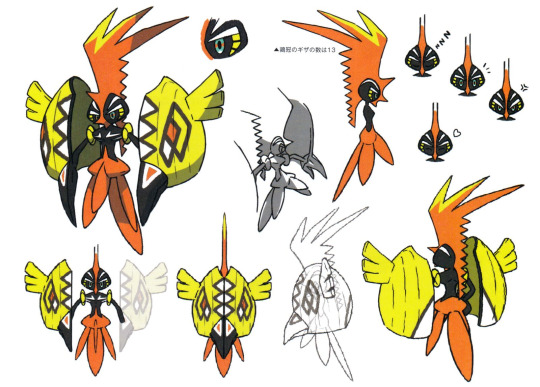
The orange and yellow palette is also nice, as it's very high-contrast and pops well against the black body. My only nitpicks would be that the two pairs of chest markings feel a bit too busy, as do the lines in the yellow part of the eye (though granted, they all have those). Otherwise, this is a very neat design.
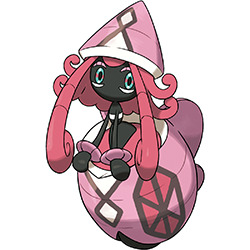
I like Tapu Lele because it looks all cute and pretty and then it turns out it's an incredibly cruel nature deity that does not care about the suffering it causes. It and Beautifly should be friends.
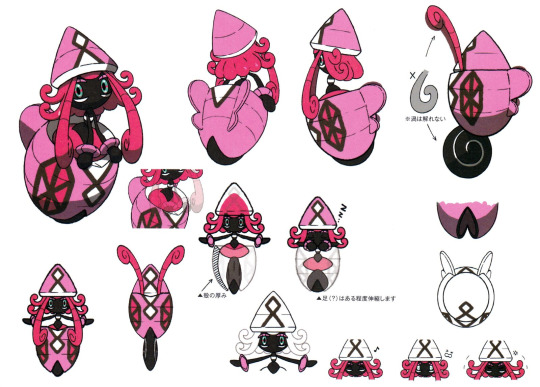
Anyway, Tapu Lele is meant to resemble a butterfly head, with the hair curls becoming antennae and a tentacle emerging from the bottom that resembles a proboscis, along with two wing-like structures on the back. I don't think it reads quite as clearly as some of the others, and I do wish the body took after its animal more (the creature itself having no insect-like traits, compared to the other Tapus where you can see the animal influence outside of the masks), but it's still neat.
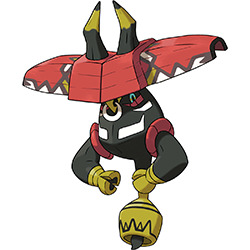
Tapu Bulu probably resembles its animal the most in terms of body shape, having a bull's signature nose piercing and hooves, as well as horns. Most interesting is the long tail, which not only matches the hooves but becomes the bull's nose ring when the mask closes.
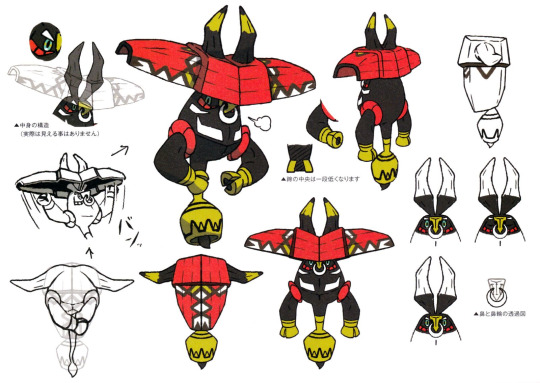
The colors are nice and high-contrast, but I do wish it had been green instead of red. Koko is yellow and orange, Lele is pink and red, and Fini is purple and blue. Having Bulu be red and gold feels too similar to Lele, even if it fits the angry bull idea. It also would've made sense from a typing perspective, as Tapu Bulu is the grass-type of the group (even the horns kind of look like pencils/wood).
Otherwise I don't have any real complaints, outside of the face markings feeling a bit busy, as you have the nose, ring, and three different eye markings. I feel like they could've easily dropped the white eye markings and not lost anything.
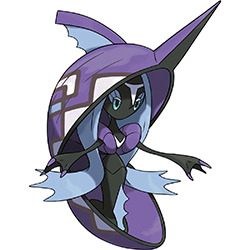
And finally, Tapu Fini is probably my least favorite of the group, though it's still a good design. I like the body shape (kind of siren-like, though I don't know if that was intentional) with fin-shaped accents in the hair, on the hands, and on the body.
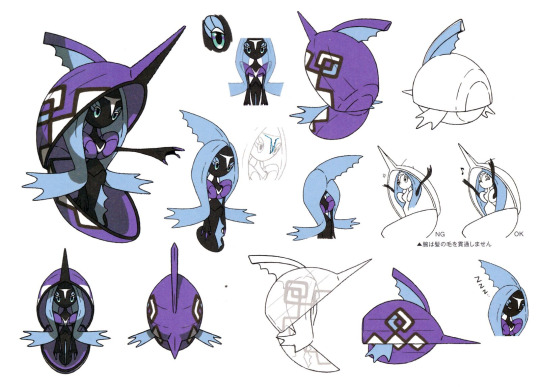
When it closes its mask it resembles a swordfish of sorts, with the hair strands becoming the side fins and the hair fin slotting into the mask's purple ridge to form a dorsal fin. Something about the fish itself feels a little off though; maybe it's just that it lacks a tail fin, or maybe it just looks a bit too plain compared to the others because it's meant to be viewed more from the side. Still a pretty solid design all around though.
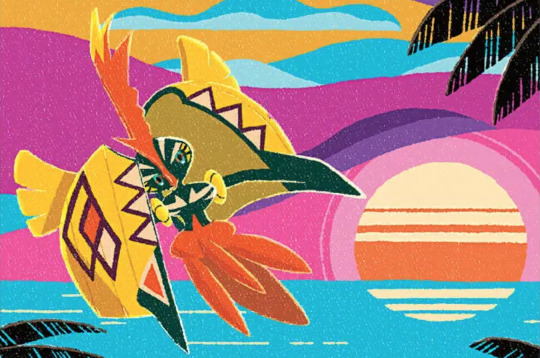
Anyway, overall, I think these guys are great. They're cohesive but distinct, have unique visuals and themes that set them apart from other legendaries, and designs that work from both a visual and mechanical standpoint. Good stuff.
99 notes
·
View notes
Text
My fucking god. There is so much to take apart.
This episode gave us a peak into Dennis’s mind and it’s the closest thing we’re gonna get to putting him under a microscope like a little bug and studying him in a lab. It isn’t what I expected from this episode but man oh man am i glad to have it. There’s a few things we need to establish first that’s gonna be the basis of my analysis. Dennis is angry, but he ultimately uses that anger to mask fear, pain, and every other emotion that he doesn’t allow himself to feel. Also, the entirety of the episode— every little detail was intentionally conjured by Dennis’s mind either consciously or subconsciously so none of it is off the table to dig into.
There’s two big things at play here— one, his desperate need for control; and two, his instinct to self sabotage. This episode did one hell of a job at showing how woven together the two are.
The essence of Dennis’s character is this impenetrable shell he’s built to protect the vulnerable part that sits at his core, and we finally got to see HOW he builds that shell piece by piece. This is the pressure-cooking of the diamond— if you apply enough pressure it’ll harden the shell.
Everything is thrown out of balance when Dennis learns about his high blood pressure, but what really bothers him about that is the inevitability of aging— something we’ve seen him be insecure about for many seasons. But what’s different about this episode is that while his usual fear of aging comes from vanity, this time it’s combined with Dennis being so afraid of the world around him changing and leaving him behind. This follows the thematic trajectory of this season— all the characters struggling to cope with inevitable change.
A stress-free day at the beach is a pipe dream. Happiness is something so hopelessly distant from him that he builds a fantasy about chasing it while never getting there— sabotaging the plan because he either thinks it’s too impossible, something he doesn’t deserve, or both. This is not the first time we’ve seen this from him. In The Gang Saves The Day, the rest of the gang’s fantasies revolve around them finally getting their dream ending, while Dennis’s stuck out from the others as a barely comprehendible mess of his own misery. (I’m gonna rewatch this episode soon and give you a full breakdown of my thoughts). Dennis self sabotages in his own fantasies because he can’t imagine a reality where he is capable of getting what he wants. Dissatisfaction is something so permanent to him, and Dennis Takes a Mental health day is all about him trying to cling to things that are permanent to regain his sense of control. He is creating uncertainty in his own fantasy so that he can be certain about it. He is such a broken man and it is such a fucked up cycle— one thing continues feeding into the other. “The pin’s the key to the phone, the phone’s the key to the car.”
The primary source of his frustration in this episode was the automated systems, which I think holds place to represent more than one thing. It’s a symbol of the changing world that he can’t control or escape from, but it also represents the parts of himself he’s fighting against. He forms systems in his life that are so methodical and complicated that it gets in the way of his ability to have real human connections. They went right on the nose with it in this ep by having him spelling out his own name as an acronym in a fit of rage. Subconscious Dennis’s d.e.n.n.i.s. system is fucking crazy.
D- “Deliver me from this”
E - “Engage with human”
N - “Nightmare”
N - “NIGHTMARE”
I - “Is this real?”
S - “Somebody help me”
If you interpret this as his frustration with not only the state of the world but himself and his perpetual loneliness it gets incredibly heartbreaking. Guys I’m really tearing up here.
His interactions with others in this episode also say so much about him and the inner conflicts he’s experiencing. He knows he establishes control by taking his frustration out on other people, but he simultaneously struggles with that making him a bad person. He yells at the customer service workers and then APOLOGIZES and reassures them that it’s not them who he’s really mad at. He doesn’t mean to take it out on them. (Potentially wild implications for Dennis woobifiers here.) He wants to take his frustration out on people who he believes deserve it, like the CEO. He gets to see himself as a hero in this story even if he’s miserable. If happiness is a pipe dream, he can settle for second best which is the rush he gets from taking his pain out on the guy who fucked him over. But he is simultaneously the person he spent his entire fantasy craving a real human connection with. He doesn’t know how to do that. It got weird and a little sexual (he definitely wanted to fuck that guy till the room stank). he is vindicated with violence at the end, which is ultimately what he will always resort to because it gives him the sense of power that desperately needs to make the frustration, vulnerability, and weakness go away (mentally AND physically). This is his cycle.
I’m not sure Dennis could have an episode where he breaks down and cries and has a huge cathartic moment and then goes back to his regular self the next episode the way Mac and Charlie have. Dennis is a whole other can of worms. RCG are comfortable with exploring different sides to these characters as long as they are kept in a state of limbo for the length of the show, but letting Dennis openly express his feelings (even to himself) might make it impossible to come back from because this is literally the entire crux of his character. The last time he opened up emotionally he fled to another state only come back a year later more hostile and emotionally distant than ever. They had to put a hard reset on him after season 12 because they knew that version of him didn’t have longevity in the show. I WISH so fucking bad that they would explore the vulnerable parts of him more explicitly on the show but for now I will settle for being a little vulture and picking it out of the carcass of this season.
#iasip#i had a lot of thoughts about this ep#this is just my raw opinions#i call this my 2:00 am autism + adhd combo move#would you believe it if i said i had more that i cut out 😭#tell me ur thoughts pleaseee
283 notes
·
View notes
Text
TMAGP 12 Thoughts: Nostalgia Bait
I have no real preamble on this one. I think it was a fun, straight forward, episode without too too much to really sink out not-soft teeth into here. Also please laugh at that subtitle, I'm very proud of it.
Spoilers for episode 12 below the cut.
A lot of office stuff here it feels like. Not a huge amount to really say on it as like with the rest of this episode it's more building on stuff we've already seen than it is adding new things to the show. Which is obviously not a bad thing but it's fairly straightforward. Celia and Sam are going on a date, which is cute, and Alice is very obviously jealous, which is also cute.
"You wouldn't be tempted?" "No" [bzzt]. Uh huh.
So first things first for the incident, this episode took places on 09/03/2024. 09/03/2024 is the date the incident in episode 10, Saturday Night, was filed. So everything that went down here was the same night that Gwen gave Bonzo the instructions and presumably he just killed whoever had their name in their. We don't really know who that was as of yet. Of the known characters I said it'd likely be Klaus but this was someone new. They're only identified as "Baz" in the episode, assuming the first victim was the main target, and we don't know any Bazs, Basils, or Barrys AFAIK. But if that's someone Gwen would know I think that only leaves two or three people it could be. I think most people will think Baz is a Bouchard or some other family member. I think it's possible that it's either someone on the corporate ladder that Lena eliminates as a show of "this is what it takes to move up in this company". There has been a lot of focus on Gwen's naivety in that area after all. The last main option I see is that it could just be someone fairly "random". Not someone Gwen is necessarily connected to but just some form of threat. Gwen "knows" them more in a general sense of "you know what I'm sending him to do, eliminate a threat". Hard to say just from the incident alone. The lunchbox and theme tune are "real" too, which is fun.
Outside of that not a load to say but it was a fun episode and it's nice to see Bonzo doing Bonzo things. It's really interesting that he appears to have either two "forms" or that he's got some sort of mental manipulation abilities. When Gwen saw Bonzo, despite being aware of him from TV, she reacted with abject horror. The party guests didn't. So either Bonzo didn't look like his current self or he's able to manipulate people's perception of him. Both would account for the reactions he got. Just a guy in a Bonzo suit. Not a sweaty meaty monster.
After that we just see Gwen horrified by the case. Which is an understandable reaction but I don't think its an elucidating one. I wouldn't say how she reacts shows anything beyond terrifying realisation about what the OIAR is. Her brief conversation with Alice also leans in that direction. So if it's a family member it doesn't look like one who's loss is felt as an immediate gut punch.
The only other comment I have on this is how refreshingly different Bonzo is being treated as a primary monster in this show. Unlike in TMA which did a lot of slow build up, small appearances, and things like that we've gotten two episodes very close together where he shows up and is a large focal point of the episode.
------------------------------------------------------------------------------
Incident/CAT#R#DPHW Master Sheet
DPHW Theory: 4728 all seems pretty reasonably for what we saw. Death and Helplessness were not major thematic factors but Pain and Weird very much were.
CAT# Theory: 1.
R# Theory: B is totally in line with my ideas on this.
Header talk: Mascot (Kids) -/- Frenzy is what I have been waiting for. Sweet repetition. Sweet, sweet repetition. Episode 10, Saturday Night, was CAT1RB2275 - Mascot (Kids) -/- Murder. An identical Section (Subsection) with a different Crosslink.
This largely confirms that Crosslinks impact DPHW gradings. It doesn't say much about how these things are calculated but I'd wager it's something like Section (Subsection) gets a rating that is then modified by a Crosslink. Rather than all those combinations being in the book. It's not exactly useful information but does give more clarity on the role of the Crosslinks. With both cases having the same CAT#R# it's impossible to say at the moment whether that can be changed by the Crosslink.
42 notes
·
View notes
Text
I wanted to show this in my art before I talked about it, but since I’ve been feeling kind of unmotivated to make any art I feel comfortable with posting lately, so I might as well just talk about it
i heavily associate geno with white lilies. originally this was on a whim, just because i thought it fit. i drew white lilies in his sockets and growing around him and weaving through the gaps in his bones
this was a frankly amazing coincidence, though, because after looking into them more, they’re frequently considered symbols of death, grief and mourning. which ties into geno’s story and character surprisingly well.
however, they also represent rebirth and restorted innocence, which could relate to the new sans that was formed to replace geno in the timeline after he got trapped in the save screen. when that sans (who i call after) was created, he didn’t retain any of geno’s memories regarding the RESETs, which ties into white lilies really well. it might also refer to geno’s “rebirth” when he was able to leave the save screen and had his HP and (parts) of his body restored, also symbolizing the escape from the old cycles of resets. going even further with that, white lilies also are believed to be tied with the departure of the SOUL— which connects pretty well with chara finally accepting their death and leaving frisk’s body, letting them do one final pacifist route.
what i also find an amazing connection is the symbolism of white lilies in reapertale. it’s common knowledge that reaper’s touch kills everything living. this is a big factor in the white lily that life gives him in the comic. she tells him how mortals use it to symbolize death, and ironically, reaper kills it as soon as he touches it. but later, toriel makes him one made of glass using her powers, so that he could have a flower that would never wilt, never wither
and that connects back to geno, full circle. geno is reaper’s glass lily. he toes the line of death, but he’s something that reaper can touch without worry or fear of him dying.
i also just really like this idea because i hc geno to enjoy botany and plants, (also because i love when dust is characterized to ALSO be a botany nerd— i think they share an interest specifically in medical uses of plants, with geno also branching out into symbolism and dust experimenting with toxins. they should have an insane greenhouse together)
edit: you CAN tag this as afterdeath but that was not my intention.. i prefer to explore all these dynamics more thematically and platonically :-)
#geno sans#aftertale#reaper sans#reapertale#dust sans#murder sans#<- a little bit.. but i cant go without mentioning geno and dust yk me#i should have a tag for my yapping. i’ll figure it out later#fauxfan
23 notes
·
View notes